Memories


Memories



Memories of a Kettleman City Kid
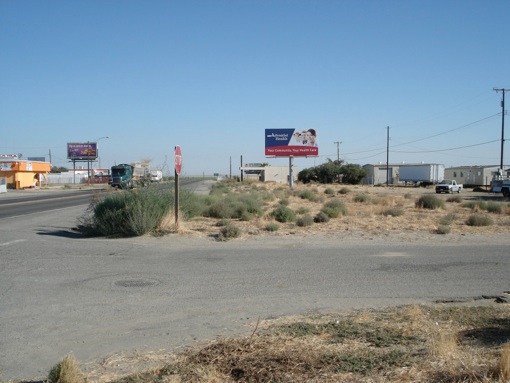
Downtown Kettleman City
Kettleman City
Kettleman City is a dry, dusty town in the middle of California’s San Joaquin Valley. When I was born there, in 1936, it was 13 blocks east to west, 3 blocks north to south. Most houses had a little patch of lawn in front, maybe a little patch in the back. Mostly bent grass or bermuda, which appeared to live--if not thrive--with little water. A few flowers huddled near the houses on some sides, clinging to any shade each small building might provide. The rest of the house was surrounded by dry sand. Many houses had an extra lot or two to the side or back. There was an occasional tree, but no lush shrubbery or lovely elm or maple trees. Water was expensive and was generally dispensed in the early morning or late evening when the thirsty sun would not draw so much of it to itself. The streets were paved, poorly, and very hot in summer when kids mostly ran barefoot.
The grammar school (the only school in town, high school being 25 miles away in Lemoore) had large green lawns (compared to the rest of the town) and some shrubbery around the building. The schoolyard had some monkey bars in the play yard, and to the west was a paved area with basketball hoops at each end. One of my eighth grade class projects was to do a census of the town. We came up with a total of 299 people, 301 dogs. We didn't do cats.
The town had a small swimming pool, next to the basketball area, that was filled with water in summer. It was emptied, cleaned and refilled on Mondays so Tuesday's swim was pretty brisk. However, heated by the summer sun, it would be quite comfortable by about Wednesday. There were sidewalks around the school on which the kids could roller skate. The only sidewalks in town. The pool and the sidewalks at the school were pretty much the only recreation offered to the children of the town in summer, other than the distant low sandy hills that we often walked to and hiked up, with lunch and a quart of milk with chocolate mixed in, wrapped in newspapers to keep it cool. For the older kids and adults there was a baseball field at the east end of town, across the highway that ran through that end of town.
The highway was the second street from the eastern edge of town. On the east side of the highway, north to south, was a gas station, a large empty field (that whole block), and another gas station to which was attached another restaurant. On the west side of the highway was another gas station, a small cafe, an empty field, a general store which also housed the post office, an empty two story building that used to be a hotel my sister says, and a county fire station. On the northern street in town, Milham Avenue, in the block east of the highway, was the Kettleman City Hotel. They usually had weekly or monthly (or longer) tenants. I don't think they had many drive by visitors. To the west of the highway the north side of Milham Avenue was desert except for the bar which was a block west of the highway. I was probably preteen when I woke one night to a lot of noise, the bar was burning down. East of the highway was Friend Street, along which were a few houses standing against the open desert, desperately clinging to what was hoped might be some semblance of civilization.
When I lived in the town the fire station, the school, the general store, and the sheriff (he lived two blocks west of us, next door to my uncle) had the only telephones in town. If there were an emergency, the fire station was called and someone would go fetch the needed person.
The church was on Eighth Street, three blocks up from the highway, and across from the little city park where my dad grew lovely roses until they decided anyone who worked for the county must sign a loyalty oath (McCarthy era), which offended him deeply, so he lost that job to someone who did not tend the roses as well as he had.
We lived on Fifth Street, six blocks west of the highway, Becky Pease Street was the first street to the west. The streets were counted starting at the “top” of town which was the west end, not from the north. The land rose slightly, east to west.
The sheriff, Dan Hill, also worked at the school and drove one of the school buses. At some point I learned that Mrs. Hill was very nice and liked children. She helped sometimes with the girl scouts when that group was still alive, altho' at first I had been reluctant to go there as I was scared of their 4 boys. The oldest boy, Dan, was my age, but I always tried to stay clear of all of them.
The Hills lived two blocks north of us, on Third Street, next door to Uncle Raleigh and Aunt Elizabeth and my four cousins. Harold and Glenn were a lot older than I, probably 10 and 8 years older. The twins, Kenny and Marie were two years younger, so we played with them some. Mostly Mama did not allow us to go there and they did not often come to our house.
Across the street from us was a mostly empty block, having only three houses on the north end of the block. But on the south end of this block, across from our house, were some very large (to our eyes) tamarack trees. These trees grew quite tall as they had very thirsty roots that spread out and sucked up all moisture in the surrounding area. When my dad cut them down some years after I had grown and left town, the small trees in our front yard, that were there when we arrived and never grew to more than eight or nine feet tall, suddenly developed a growth spurt and grew into quite nice shade trees.
The tamarack trees were a wonderful haven for the kids. They were strong, with lots of limbs, and great for climbing. I could climb higher than any of the other few kids that played with us on our block. They were wonderful for hiding in for kick-the-can in cool summer evenings after dark. I could sing and taunt and not be spotted and called off by whoever had lost the can last round. It was kind of unfair and soon became boring, staying in the tree by myself when whoever was “it” gave up looking for me. To us, those trees were the best recreation offered.
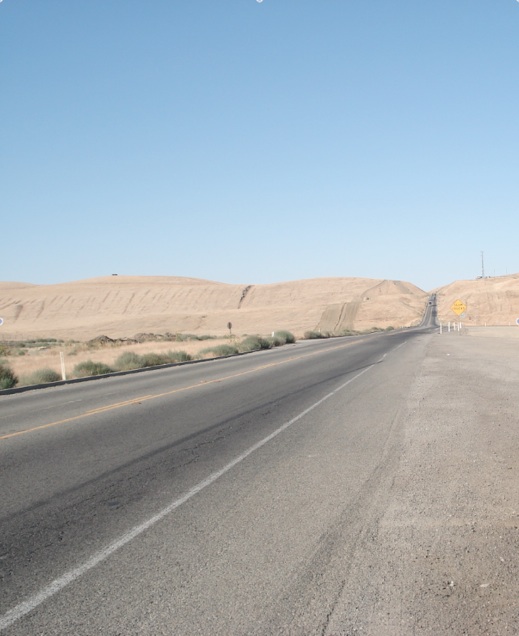
Heading south out of town on Highway 41
Fourth of July in Kettleman City
The Fourth of July was, to some degree, a nice boon for my mother. An easy way to actually get decent work out of my brother and me due to the fact that before we could light any fireworks the weeds would have to be cleared from the empty lot beside our house. Usually Eddie & Carl would share this chore. Eddie & Carl, two brothers who lived a block down the road from us, usually shared whatever we did, and vice verse. So the first days of July saw us kids actually working with a good grace, not only clearing the lot of weeds, but also leveling out land, filling in the holes previously dug for forts to hide in when we had clod fights. And since the land was pretty much sand and we had probably had no rain since the end of March or early April, there was not a lot of vegetation to worry about. Mostly foxtails, puncture vines (known to the rest of the world as goatheads, but we knew them for what they did to bicycle tires), and tumbleweeds.
And from our perspective, the work of the weed cleanup was not all that bad, as the burning of the weeds after we had cleared the lot was a lot of fun. And when tumbleweeds were involved, pretty spectacular, because when touched by a lighted match a dry tumbleweed explodes into a fierce fire that consumes the whole plant in 3 or 4 seconds, leaving only a few ashes and bits of debris. Almost as much fun as the fireworks.
Setting off the fireworks was also a joint affair with Dixie & me and Eddie & Carl. We would spend the day of the Fourth planning and organizing the show. What firework would go first, who would be the first to light it, and who would light which fireworks. A few other kids might show up for the show, but it was our show.
We learned what fireworks worked well—of course, sparklers, any shooting things, and those smoky worm-like things for early in the evening before it got really dark, which ones were more trouble than they were worth—those spinning things that were always either nailed too tightly and refused to spin or, more scary, too loosely and flew off the post causing some danger to the public. Since the crowd was usually pretty sparse—Dixie and me, Eddie & Carl, perhaps our cousins, Kenny and Marie, and occasionally another kid or two who heard about it and whose parents either did not keep a close watch on them or gave them permission to join our festivities, we never had a disaster.
We took the responsibility of preparing and setting off fireworks pretty seriously, knowing there would be another Fourth of July next year, and we were good (OK, obnoxious, bossy, and maybe a little anal) about safety, and did our best (and loudest) to make sure all the spent and very hot sparkler wires were collected and safely put into a can for later disposal so no bare feet would find them and get a bad burn. Since my father was rarely involved in anything we did around home, my mother was sort of de facto boss. But her actual interest in fireworks was pretty minimal so as long as we seemed to be behaving and being careful, she let us handle the evening. I think also, that this was an opportunity for us to choose to behave responsibly. And that was kind of fun, too.
Curiously, this sense of responsibility and good behavior often carried over into the next day when we could be found picking up leftover debris from the previous evening’s celebration.
Other than our Fourth of July celebrations, and an occasional overturned garbage can at Hallowe’en, the only other excitement I remember in town was one Hallowe’en when some of the teenage boys balanced one of the teeter-totter boards on top of the ridge (the round tile at the top of the roof) right in the middle of the grammar school roof. No one, of course, ever knew who was responsible.
Doris Tuck, 2008
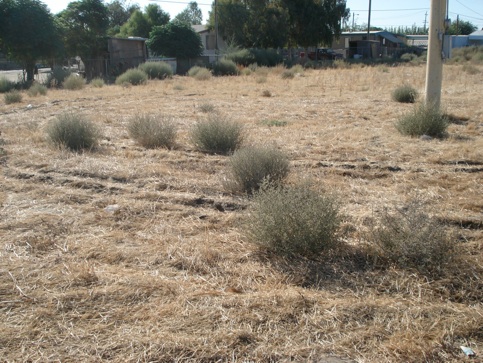
Kettleman City
Long Weekends
Daddy worked in the Kettleman Hills oil fields. He worked in the gang and their shifts were days, evening tour (pronounced tower, for some reason), and morning tour. He worked six days on, two days off, and every once in awhile his days came around to where he had a Friday and Saturday off one week, backed up to a Sunday and Monday for the following week. That was four days and in the summer this meant a camping trip. Often Yosemite, sometimes Sequoia or Kings Canyon. Once we drove up the Redwood Highway for 2 weeks, camping along the way.
Daddy loved the mountains. And Dixie & I loved the camping. When we were old enough to go off without motherly supervision, Mama loved it, too. She & our bob-tailed Australian sheepdog, Sambo, had a happy and peaceful four days off with no kids, no meals to prepare, and peace, beautiful peace.
We did lots of hiking when we went camping with Daddy. Dixie & I would be trailing Daddy by ever increasing distances, as he set a good pace and never faltered. He would stop somewhere cool and comfortable. A nice comfortable rock or stump somewhere cool and shady, by a creek, if possible, where there was water, which at that time in our evolution—devolution?—was still safe to drink. Or if it was not, we did not know it. We never carried water. We always found water along the way. We also did not fixate on the need for water. By today’s rules, we were probably dehydrated most of our lives, but didn’t know it.
We have hiked many of the popular trails in Yosemite Valley. Mirror Lake (now Mirror Meadow) was an easy hike, Vernal and Nevada Falls many times, Yosemite Falls once or twice, and we hiked down from Glacier Point once, but never hiked up. We have hiked the Mist Trail (to Vernal Falls) and on up the regular trail to Nevada Falls, and have hiked the John Muir Trail (that we knew only as the horse trail) to both Vernal and Nevada Falls.
In the summer I was 16 we hiked Half Dome. I should say, we hiked to Half Dome. It was a long hike, Daddy briskly hoofing it up the mountain, Dixie and I pretty much dogging it, probably complaining, but with no one around to complain to—Daddy was, of course, long gone, we could never keep up with him—we probably did not waste a lot of breath on that activity.
We arrived at the base of Half Dome, tired, hot, low on enthusiasm, and looked up at the steep and gravelly climb to the base of the upper part of that rock, then those cables that you must use to pull yourself up to the top.
We scrabbled our way up through the shale and gravel to the cables, then started dragging ourselves up the cables. I pulled and pulled, stopping to breathe occasionally, but somewhere along the way, maybe halfway, I made the mistake of stopping for a bit, and turned to look down. OMIGOD! It was almost straight down. It looked like about an 85 degree angle from the ground. I stood there hanging on to those cables—literally, for dear life—and thought about it. I knew if I did not continue to the top I would be forever sorry as I probably would never do that climb again and I would not be able to say that I went to the top of Half Dome. After that long hike. I knew I should continue on. But when I looked down at that steep, steep angle, I questioned whether I could get down to safety from where I was, let alone from even higher.
I made the very conscious decision to turn and go down before things got any worse. I shuffled and slid my way back down on my butt, hanging on to the cables above my shoulders like an ape.
And I have often been sorry. But I also remember how I felt at the time and understand and forgive myself.
Doris Tuck, 2009
Chinese New Year
Dianne and I worked together for several years, many years ago, and became good friends. She has been teaching English at a university in China for the last 6 or 7 years. Some years ago when I was still working, she needed a car and since she and her teenage son did a lot of cross country skiing on weekends, she wanted something that would be good in the snow and something large enough for her two Borzois to be comfortable in. A station wagon of some sort. But not an ordinary station wagon, something with 4 wheel drive. Something good for the mountains. What she really wanted was a Jeep. Well, Jeeps are cute, but they are not a reliable car, especially for someone who is not mechanical. As Roger says, they break a lot of unusual parts that other cars never break.
My youngest son, Tom, is a good mechanic. Now most especially diesel, being a strong biodiesel proponent. He is also a Jeep lover. He was a founding member of the FSJ—Full Size Jeep--club, where a bunch of guys go out in their FSJs for the weekend or week to see who breaks what, and the lucky winner waits along side the road, probably in snow and ice or some such, until someone goes home and gets a part or a tool or a new engine and brings it back to them and helps them install it. Likely as not that person breaks down somewhere enroute and has to call for help for themselves, delaying assistance for the first breakdown. I am not making this up.
Tom strongly disrecommended a Jeep for her. She seemed pretty adamant, but we told her lots of stories and about about all sorts of potential problems, hoping to dissuade her. She was doing OK, financially, but she sure didn't need those sorts of problems, as too often the least of the problems is financial, especially for women and/or non-mechanics. Wanting to help, I would frequently check the Internet NetNews For Sale site (I wonder if, in this age of Craig’s List, Facebook, and so many other social groups, New News is still around), looking for something appropriate to suggest to her. After a week or so I found a Subaru Forester that looked like it would be just the ticket. Besides, I loved the Subaru commercials where this woman in some other four wheel vehicle, wearing high heels and miniskirt (what an idiot!) stands waving her foot around in midair, trying to find the ground from where she perches three feet above it on whatever passes for a running board these days. Then they show the Subaru sitting comfortably near the ground and its woman gracefully hops out and walks away. Great commercial.
So Dianne called the fellow, went to see and drive the car and decided it would suit her needs. We were pleased. The car had a not very serious sounding noise (to her, meaning not very loud) which he told her was something to do with the catalytic converter, something simple, something that would be inexpensive to fix (having recently replaced a catalytic converter, I cannot imagine what he supposed that might be). She made the agreement and on the appointed day I picked her up and drove her from her home in Fremont to Santa Clara where the auto was located and where we met this young Asian engineer. I walked around the car and it looked fine on the outside. We were happy. Dianne gave the man some cash, took possession of the keys, and got into her new car, started it, and drove away.
I stood in the parking lot watching—and hearing—as she drove away and I knew that puffing sound had nothing to do with a catalytic converter but was a blown exhaust manifold gasket. Probably $800 or more to replace.
I was shocked. But there was nothing to do. It was done and she was gone with the car. I got into my car, but before I started my engine I looked up at this young man who happened, at that moment (unluckily for him), to glance at me. I looked at him with such intense accusation, “You are a liar, a cheat, and a thief.” I sent this message to him so forcefully, and I could tell that he got the message. I saw the look on his face as he looked at me. He knew he was a liar, a cheat, and a thief, and he knew that I knew he was a liar, a cheat, and a thief. I drove away feeling a very slight bit of satisfaction knowing that he knew that I knew.
However, the deal was done and Dianne was gone--happily--with her new car.
I drove home and told Roger about it and forgot about it until she called a few days later after taking the car to her mechanic and learning the truth. She was devastated. But nothing to do but pay the $800+ to have it fixed and move on.
Over all, and other than the negative beginning, she was fairly happy with the car and enjoyed trips to the mountains with it. She liked it so well that some years later, when it got old and tired, she purchased another Subaru. A new one.
Some time in early February, a few months after purchasing her new used Subaru, Dianne invited us to go with her and son Kevin to Clair Tappan, the lovely Sierra Club lodge near Soda Springs in the Sierras, for a weekend of fun in the snow. We knew nothing about cross country skiing other than what she had told us but it sounded like a fun thing to try. At least spending the weekend in a lodge in the mountains would be fun. So Friday evening Roger & I drove to her home in Fremont and joined her and Kevin for the ride to the Sierras in her new used car that she had come to enjoy quite a lot.
And it was fun. We had lovely breakfasts and dinners with lots of Sierra Clubbers and took our turns doing a chore each morning. I swept the kitchen, Dianne did the dining room. Roger, without checking the situation very carefully, chose the supposedly easy task of taking out the garbage. Which turned out to be a fairly dangerous duty, slipping and sliding down the icy 40' bank cut to the garbage cans below.
Chores done, we found lots of makings for lunch laid out on the dining room table and we fixed sandwiches, chose a fruit or two, a few carrot sticks and other snacks to take with us out on our big adventure. Where we spent much of our time on our butts in wet snow. But staying in the lodge was lovely and I very much enjoyed lounging in the big room with the huge fireplace, reading and people watching. I always thought I would love to go there again, just to sit around the lounge and fireplace and read in such lovely peace. But we never did.
When we returned to Fremont Sunday evening we offloaded our stuff from her car to ours and drove home. We had barely gotten in the door when the phone rang.
Dianne, very excited, seemingly in some degree of shock,
“Doris, guess what happened?”
Well, we had no idea, of course, so she enlightened us. A letter had arrived Saturday from the man from whom she bought the car. With a check in it.
She further explained, “I know what he's doing. Chinese New Year is coming and he has to clear his conscience of all debts before then.”
“Wow! Well, my goodness. Isn't that wonderful! How much was the check for?”
“The amount I paid for the car!”
“WHAT? WOW! What are you going to do?”
With a little nervous laugh and just a tad timidly, “Well, I'm going to keep it.”
Ever tactful double Aries Doris, without stopping to consider even for a second, blurts out, “Oh dear, then you're no better than he is.”
sssiiiiigggggghhhhhhhhhhh
Well, she returned to him all but the cost of the repair and was happy. I expect he was very happy, too. With himself for doing the right thing, and with his customer for further making things right. Happiness all around.
I also am quite sure that, given a few moments, she would have made that decision on her own, without Doris's big mouth.
My First Grandchild
Almost 27 years ago my daughter delivered my first grandchild, Tamsin Marie Bourg. In Virginia. She was in the Air Force at the time, her husband in the Navy.
Roger & I were both working, of course, and for a much smaller wage than we later earned. At least, in my case. So it was 7 months before we were able to fly to Virginia and see my new granddaughter.
My daughter had called me once, some years earlier, and asked where I had gotten her name, Deana Vianne.
As I came into adulthood I had known a young girl, a daughter of my sister’s friends, named Deanna. I kind of liked it, but when I had my daughter I had come to like the two syllable version better and gave her the first name of Deana. As to her middle name, I explained that her father had promised his mother— without consulting the future mother of any daughters—that if he ever had a daughter he would name it after her. Her name was Viola Ione. So I made a slight compromise, making it a combination of the grandmother’s names. My mother’s name was Beth Ann.
She said, “Thank you, Mother.”
Some years later she called and asked me, “Mom, what was the name you wanted to call me but Dad didn’t like?” This was Tamsin. I had read it in a book once when I was a kid and always wanted to name a daughter Tamsin, altho’ I had never known anyone by that name or ever heard or read it again anywhere. And I cannot remember where it was I first read it. I have since learned that one of the Donner Party was named Tamsin. Also, I think, one of Winston Churchill's daughters. Or some relative of.
I was very pleased and proud when she named her daughter Tamsin.
We had a week to fly to Virginia and see this lovely grandchild. I was tasked with bringing some California wine and french bread. Also warm clothes as it was February. Which meant we were pretty burdened with baggage.
Roger’s youngest sister, Candy, was living with us at the time and would drive us to SFO to catch our Eastern Airlines flight to Richmond. We loaded up Roger’s old Ford wagon with all our stuff and headed out with a lot of spare time. Luckily. As the wagon was having some problems running. It kept dying. Roger’s cars at that time were all very questionable. But being a guy, and a confident mechanic, he never worried about something not running well. He could always fix it. Never mind the inconvenience and other problems a dead—however temporarily—car might cause. We soon learned that we would not make it to SFO in time for that flight in that car. So before we were out of San Jose we turned around and headed home to transfer us and all our luggage to my bug. Which had its own problems. Only three of its four cylinders were working, Roger having disabled one on our trip home from somewhere else a week or so earlier when it kept backfiring or something and he determined that we could run fine, with a bit less speed and efficiency, with the other three.
Back on the freeway, slowing the slow lane more than it was used to as we lumbered up the road on three VW cylinders. We gave Candy instructions to loop the airport a couple of times in case we did not make our flight, which was in serious doubt, and we grabbed our suitcases and bags of wine and bread and ran for the counter. They took our tickets and checked our bags but expressed doubt as to whether we would make it onto the flight and frankly assured us that our luggage would not.
Roger grabbed his carryon bags and ran for the gate and I struggled and staggered along with the bags of wine and bread banging against my hips and legs. They saw him coming and waited for him but he stood in the doorway that they were trying to close until I lumbered up, panting and sweating with all my stuff.
I couldn’t believe we made it. And we had 3 plus good hours to catch our breath and settle down before disembarking in Atlanta and spending a couple hours exploring that very efficient (and very large) hub. We arrived in Richmond with bread, wine, and other goodies intact and scrambled out to find my new granddaughter.
Who was as beautiful and lovely as anyone could have imagined. And fearless. She had no problem coming to me and then being passed to this black bearded man she had never seen before. Curious and confident, she seemed to be quite comfortable with the attention.
Eventually we went to make our futile check of the baggage area and what to our wondering eyes should appear but both of our bags. We were seriously amazed and impressed. I wrote a very nice letter to Eastern Airlines, complimenting them on their outstanding efficiency.
They had sent photos, of course, and I thought she looked quite bright and beautiful. Later, after meeting her, Roger confessed that he was afraid there was something wrong with her, like she might be retarded or have Downs or something.
But she was not. Definitely not retarded. In fact, as she grew into a little girl we found that she was quite bright. Which does not necessarily guarantee success or make for an easy life as I had already learned with my oldest son.
Drawbridges
Long ago, in a far away land (called affluence and available jobs—at least for the young), I followed Janet Christian, Pubs Manager at ITI, to a new job at a new company.
Being an avowed witch (in spite of her name, which she found quite entertaining) in a dying company whose lead had been taken by one of those head-up-your-control-freakiness-quote-unquote-christians, she could see the writing on the wall. In the previous administration we had received permission to set up a Buddha in the lobby (bought by us at the Buddhist temple in Fremont). We made offerings of fresh fruit and water each morning, removing them in the evening when we went home, in an attempt to bless the energy of the company hoping it would survive the long crisis in which it had been languishing for so long. When I arrived there, it had been 7 weeks since they had met payroll. And there were several couples who both worked there.
Of course, the new christian empire was horrified and it was quietly suggested that it might offend customers. Of which we had none. Since this was a software company, visiting customers (customers visiting us) were not the norm; visiting salespersons (ITI salespersons visiting potential customers) would have been the way, but I'm not sure we had any of those, either.
Janet began her search as soon as we got the measure of this phony creature that we had to watch gag and choke back tears in the company meeting as he explained why some people were already missing. By the time D Day came, where many more employees learned that they were to be relieved of duties, she had a job in hand, starting in 2 weeks after she made a trip to Texas to visit her elderly and not very well parents. It was rather a fun goodbye lunch for Janet, as we all gathered to wish well to those who had received their sorry notices. She got to announce her very good fortune to this unfortunate creature, rather than leave in defeat and fear as I'm sure he expected any decent non christian should.
I had been told I would be going also—most people would—but since I was a contractor (temporary) I could stay until I finished the project I was on. Friday two weeks hence would be my last day.
Janet had a nice trip to Texas, a good visit with her parents, and returned to start her new job at Interlink Computer Sciences on a bright and sunny Monday in September. On Tuesday she took my resume to HR, on Wednesday they called me, on Thursday I interviewed, and on Friday I started working with her again. The reigning Pubs and QA Manager, Wayne Lord, was a wonderful man that we all loved. He drove down to Fremont from San Francisco every day. Janet was happy to be lead writer, and I was happy to be working under her lead. And we were both very happy to be working for Wayne.
It was a very good company, a very good job, and we had a great time there. Teresa used to laugh when Janet came in every morning and the first words out of her mouth were, “Where are we going for lunch today, Doris?” By then I was making enough money to go out to lunch on a regular basis. Taste of India, Manju Farsan House, and East Bay Thai were our favorites and we visited each of them at least once a week.
At my age (late 50s at the time), I was offered a contract (temporary) position for a decent wage and I was happy to take it. After a couple months they discovered that in spite of my advanced age I really could work and do a good job and offered me a direct full time position. At a wage I had never dreamed of.
To which Janet commented in disgust, “Doris, if you take that some man will just get more!”
I was stunned. But I sat on the offer for about a week, then Wayne came to me and offered an increase of more than 10%. Stunned was not the word. I choked and accepted.
Life was very happy there for about 6 months until Janet, mulling over her recent visit with her parents, decided that life was too short and her parents too old and she needed to be near them.
Wow! Talk about rocking your world. I was very sad about this and would miss her much.
Janet had talked about visiting the old ghost town of Drawbridges, now sunk below water level out in the middle of the bay, where it sometimes sat in very gooey mud, sometimes in a foot or more of water, depending on the tide. Roger had talked of this little town early in our relationship and had promised to take me there someday. Since there are no longer roads available, water is the only way to get there. Well, that's OK. Roger has lots of boats, so problem solved.
Oh, and a train goes through there twice a day, that being the original reason for its existence.
So Janet & I pooled our resources and started working on Roger. Well, to be honest, when either boats or adventure are the subject, he does not need much work. In fact, he works rather hard himself. Choosing best boat to use, outboard that would be strong enough to buck the tide but not too heavy for him to handle alone, and researching where best to launch and which slough to take to get to the proper place for accessing the remnants of the little forgotten town.
One chilly and drizzly Sunday morning in early March, a few weeks before Janet & Eric were to move, we set out for the chosen launch spot off Dixon Landing Road in Fremont, donned our rain gear and hats, and entered the water. It was a good 2 hour putt with our small outboard up the slough to the train track supports where we climbed up to the tracks whence we could reach the ghost town of Drawbridges.
We knew we were not supposed to walk the tracks, but it was only a few steps along the tracks to the edge of the levee where we could walk through the center of town and see the tumble down buildings and bits of flotsam left from the lives who once inhabited this lonely place.
JUST as we climbed up onto the tracks we looked up to see a fast moving passenger train bearing down on us, furiously blowing its horn. The engineer was clearly very angry. Oh, no. And YIPES! We pasted ourselves against the concrete wall that enclosed the tracks and held our breaths. That train came very close to us. It was quite scary. The wind from the speeding train blew my hat off my head and somehow placed it in our boat in the slough below.
Wow! That was not cool. No wonder they tell people not to do this. We should not have done it.
But it's done. We might as well go ahead and check out the town.
We spent about an hour wandering up and down the levee, sometimes stepping off into the mud to retrieve some broken piece of pottery or bottle, me taking photos and Janet taking videos. When we had enough, we headed back up the tracks to where our boat waited. As we walked we saw two men hanging around somewhere down the line. I was concerned that they might mess with our boat but as we got closer we could see that they were quite a ways beyond where our boat was so we began to clamber down the pilings. Then the men started running towards us bellowing very loudly, “Hold it right there!” So we stopped, wondering who they were and what they thought they wanted of us.
Well, the first question was soon answered as they got close enough for us to see their ranger (or some sort of official, though non police) uniforms. Oops! Busted!
They ran up and looked us over and one of them started yelling at us, that we should not be there, it was illegal to walk out there on the railroad tracks. The other one kind of stepped back and surveyed these old folks pulling such a foolish stunt. The one yelling looked a bit embarrassed, too, but he knew his duty and was determined to do it.
“This is private property and you're not supposed to come out here on the railroad tracks.”
“We did not come out on the tracks, we're just leaving.”
“Then how did you get here?”
“By boat.”
“Where's your boat?”
We pointed down at the boat in the water below and he looked a bit flummoxed. They stepped aside and had a quiet conversation, looking more embarrassed (I'm sure they expected to find some teenagers there, not old folks), and the more aggressive one tried to yell at us some more while the other one seemed to kind of try to back out of the situation. He was clearly uncomfortable and looked very embarrassed at his partner yelling at us like that. Probably also embarrassed at these old folks pulling such a stunt.
So the dominant one changed his tactics a bit and demanded to know what we had in the plastic bag that Janet was holding. She removed her video camera and showed him.
Well, flummoxed again.
He tried to keep up his tough attitude and told us again, very sternly, that we were not supposed to be there, we were not supposed to ever walk on the railroad tracks, and if we were to tell anyone about this we were to say that we were given a $50 fine!
Oh, boy, did that sound good to me. I feared much worse, in both degree of fine and degree of punishment (like, maybe, jail or something and many hundreds of dollars).
We promised to be good, apologized profusely—Janet was absolutely disgusting explaining that it was all her fault, she had to move back to Texas because her parents were elderly and failing and she so wanted to see this place before she left California.
After some more light scolding we were released to go on our way.
As soon as they had gone, and we were safely back down on the pillar by our boat, Janet ruined the energy of her performance by suggesting we call them back and take a video of me grovelling in the gravel to please release us.
And all these years I had thought she was my friend!
When I got in to work Monday morning Wayne talked to me a bit about Janet, concerned about her reason for leaving Interlink, if there was a problem or something he should know. Then he mentioned that she was a bit late this morning. So I told him about the previous day's expedition to which he replied, rather coldly, I thought, “Well, don't be calling me to bail you out.”
“Well, what an attitude! What kind of boss are you?” I shot at his receding form.
We had a lot of fun with this story, but we would not try that stunt again. It was very scary and very dangerous.
Amazing Success Stories
My first granddaughter was born almost 28 years ago, August 27, 1982. Strong, first decan Virgo: Modest and shy, meticulous and reliable, practical and diligent, intelligent and analytical, personality characterized by a disciplined nature.
NOT! Except for the intelligent. She is very intelligent. This showed when she was 5 years old and, looking at a drawing (on the faceplate of a children's book) of some complicated knotwork, she pointed to a couple of the interlocking lines and asked me how they did that. Whoa! I, who had always been told what a high IQ I had (one of numerous attempts to get me to pay attention and work up to some degree of potential—or even take an interest in potential, whatever that was) would have never even noticed such a thing.
She also has some analytical potential when she has need of or interest in such stuff.
Then there's the darker side of Virgo: Fussy and a worrier, overcritical and harsh, perfectionist and conservative.
These are excellent descriptions of my sister, born 58 years and 4 days earlier. Tamsin does sometimes have a harsh attitude, especially the chips on her shoulder. But other than that, these darker traits of the Virgo have no interest in Tammy.
At 7 months old, when we first met her, she had a very bold look, and was not afraid to go to these old folks she had never seen before. She did seem to check us out with care, while held within our arms, but without any apparent fear. Even Roger with his black hair and beard (at that time). We were delighted with this first grandchild. At least, I was. Roger was not much into kids and since he had no real connection to this one, he went along with his usual good humor and lack of interest in anything that was not closely connected to motorcycles or boats.
When we visited again a year and a half later when her new sister was due to appear, we found this independent and bold attitude to have grown with her, as strong and firm as what we saw in the 7 month old. To a dangerous degree. When I let go of her hand to check something out in a department store I turned to find her totally gone. I was some panicky moments looking until I found her outside the store in the middle of the mall sitting on the floor with her feet in a pool of water that surrounded a decorative fountain.
Three years later, when they came to live with us while her mother looked for work and apartment (without the alcoholic and totally disinterested husband/father), she had gotten out of hand and was not easy to live with. Her mother was having a scary time trying to put her life together and discipline had suffered.
The only time I ever saw fear was that Hallowe'en. I had been promising that I would scare the bejabbers out of her, which she boldly denied. But when I came out all hunched over in my faded looking grey “wedding gown” (from the Goodwill, died with a black dye that had come out some awful shade of lavendarish dark grey), green face, black teeth, and black-crepe-paper-covered sombrero and screamed a cackle at her, she screamed back, in full terror, and hid behind her mother.
My one success with getting that kid's attention.
She loved hangaboogers, but we soon learned that that meant french fries, which was what she would eat, leaving most of the hangabooger untouched. We learned to order fries separately AFTER she ate the hangabooger.
Deana and the girls moved to southern California when Tammy was 6 years old and there a new father was added to the mix and a year later a new brother. They finally landed in the Clear Lake area where they lived for most of their growing up years.
By now Tammy was pretty much uncontrollable. We would have taken her and tried if the parents had been interested, but being someone's definition of “non-christian,” clearly we were unsuitable and incapable.
However, as Tammy got into her middle teens even this very “christian” couple became scared and desperate and one day I had a call from Deana at work, wanting the phone number of her oldest brother, Dan, who lived in Pryor Creek, Oklahoma. A strong Leo, incapable of having an incorrect opinion, and a recovering alcoholic, he agreed to take Tammy.
I should also point out that by now Dan, originally at least as much trouble as Tammy, was offering some good back to the world. He spent Friday nights at the Thunderbird Ranch, home for troubled youth who were sent there, by parents or court, for some hopeful rehabilitation. He talked to the kids and often would bring a prisoner from the nearby jail or more serious prison to talk to the kids. Having learned early on that preachers praying and beseeching the kids to take better care of themselves and assuring them that they were loved by all, and beyond all reason, did not impress, Dan brought in the big guns. His favorite being an alcoholic who, when released from the drunk tank, immediately went out and got drunk then killed someone while driving in that condition. He would tell the kids he now lived in a mental hospital in order to escape whatever type of execution Oklahoma uses for murderers. On one occasion, Dan approached the local sheriff, a sour character with little sense of humor who did not make quick decisions, and asked if he could take someone out to talk to the kids. The fellow looked Dan over and said he would think it over, come back after while. When Dan returned he said he was thinking about it, maybe he'd meet him out there Friday evening. The sheriff showed up with the jail van containing a fellow in jail duds and handcuffs. MUCH more impressive to these kids than assurances of love, forgiveness, and a happy life.
I thought this might be an excellent choice for Tammy at this time. And it probably was. But it turned out very differently than we had hoped.
Dan got Tammy registered in the nearby high school, took her to some of his haunts that he thought would be appropriate and comfortable for her (including the local AA) and introduced her around (making sure the boys who sparked with Tammy's very beautiful and long lashed blue eyes knew who they would be dealing with should anything out of the ordinary happen), and pretty much turned her loose to live her life.
Tammy, being Tammy, of course screwed it up. A week later he called me—again at work—to tell me he was putting Tammy on a plane back to California. She had lied to him, cut school, and he was making probably the most appropriate and effective response. This was probably the first time Tammy had really been caught up by the short hairs and stopped in her tracks. Rather than lots of empty yelling and screaming and threatening.
Of course, Deana was frantic, on the phone again, this time wanting the phone number for her younger brother, Tom, in Colorado.
I called Tom and talked to him for awhile, definitely NOT advising that they (Tom and Susan, the woman with whom he had been living for some years) take Tammy on. But Tom and Susan talked about it and decided to give it a try. Tom had always had a good rapport with Tammy when she was younger and had wanted to take her years earlier but was not allowed. Had Tom had her earlier, he might have been able to do a lot with her. She had always liked hanging out with him, was a good worker (for him), and seemed to enjoy being useful and valued. With him.
Susan had never liked or wanted kids but for whatever reason she very quickly fell in love with Tammy. She was a professor at the University of Colorado, Boulder, and knew lots of people of the educating type in the area. She and Tom also ran “shooting matches,” where a bunch of people spend the day at some place specially set up for gun type games and would run and shoot at things, practicing their gun skills. For years Tom had taught gun safety classes, often attended by police officers needing some practice (according to him, usually the worst shots of the bunch—gives you a warm tummy feeling for our safety, doesn't it?). So Tammy was immersed into a very active and fun family life. Susan set her up with a teacher friend to tutor her in math and other things that she had not really studied for years and she got to learn about guns and go out shooting a lot. Of course, Tammy eventually screwed them over, too, causing damage to many of Susan's possessions (through carelessness and lack of interest in caring about anyone or anything). Eventually wound up pregnant (none of us could understand why this took so long) and moved in with a fellow that Tom and Susan had thought was a great guy.
Well, perhaps Jordan was a great guy to them but his parents had apparently had as much trouble with him as Deana & Steve had had with Tammy. In fact, it sounded rather worse. Certainly much more expensive. They got him into several different schools, none of which he spent much time at. His parents were really wonderful folks. They brought these kids to their home in Kansas, got them married (a small wedding in their church), and got Jordan into the Navy and Tammy into an apartment not far from them. (I suspect she was not pleasant to live with.) She birthed her first daughter, Rylea Hannah, 2 months later.
These wonderful folks spent a lot of time with Tammy, and especially with the baby. And they did not like what they saw.
You would like to think Tammy had had enough of drama by now, but at 18, with a new baby daughter, and husband away on the east coast, she did not do so well. Especially when she called to talk to her husband and his roommate answered, “He's out with his girlfriend. Who's calling?”
Tammy was soon in the streets again, at least one time leaving her baby sitting on a picnic table while she went off with some guy. Rumor had it she was also doing drugs, and then got mixed up with what was reported to be a drug dealer.
So the poor in-laws again intervened, called Child Protective Services, and eventually were given physical custody of the baby, the father being given sole legal custody.
Rylea turned 11 in mid May. Tammy has not seen or heard anything of this daughter for some years.
Tammy got pregnant again, eventually married Ryan (rumor has it a fellow druggie), had lots of fights and got beaten up a number of times, finally called her mother for help (the in-laws now having pulled totally out of the picture as far as she was concerned). I advised Deana against sending her money for a flight back to California as I did not think there was much chance that Tammy was going to change or be anything but more trouble for them and for the two kids they still had at home, as well as a very bad influence on the latter.
But they sent the ticket and Tammy picked up her new baby girl, Ayla, now about a year old, and came to California. Her husband there had put some kind of restraining order on her to not take his daughter out of the state but upon arriving here she showed the authorities her broken and badly healed clavicle and got a divorce and a restraining order against him.
She got on welfare, got her GED, got a job as a Nurse's Assistant at a care home, got herself an apartment, and seemed to be actually taking charge of her life.
Then she got involved with another druggie. Although she was apparently not doing drugs herself and the fellow was apparently not using very heavily, he was an ex-con, a gambler (which she found out when he took her income tax refund and “invested” it at the local casino), his main problem seeming to be a very weak personality.
Pregnant again and preparing to marry again, she then learned that her ex wanted to see his daughter and planned to drive to California with his mother for a visit.
The whole family took this in good spirits, took the ex and his mother to the coast and on some local tours and Tammy decided that she still loved Ryan and wanted him back.
Is anyone else tired of the drama yet?
So, the new druggie was out (last report back in prison) and plans were made for Ryan to gather himself together and move to California to be with Tammy and Ayla, now almost 2 years old, and new baby daughter, Lily Dean.
Since Deana & Steve were now in charge, they saw to it that Ryan lived with them and he and Tammy remained celibate through some good christian counseling until they could be married again. Oh, and of course, Tammy had to have the restraining order removed.
Tammy and Ryan remarried and settled into their life with Ryan trying to find enough work to support them. After awhile it became clear that this was not possible in California, and they decided to return to Kansas where he felt confident he could find good paying work in construction and housing that they could afford.
Actually, he wound up driving a truck, but it paid well and things went along pretty well for awhile. But the politics of the job were painful and Ryan quit it for another that did not turn out to be as reliable or pay well. And apparently other aspects of married life were also not working well for either of them. They soon were at each others' throats again. But Tammy got a job as a “counselor/guard” at the local state prison mental hospital which paid quite a bit more than her husband made (another problem). She also started taking classes at a nearby community college.
None of this set too well with the husband and unhappiness became more intense and they parted again.
Leaving out a few less dramatic details, Tammy was on the Dean's List for the first two semesters at the community college, and was on the President's List (with all As) the next two semesters.
This very troubled and troublesome child just graduated from Barton Community College with an AA in Criminal Justice.
We are SO proud of her. She had a lot of help. Her father's sister paid for her books sometimes, I paid for them sometimes, we both helped in other ways, and many others did, too. And Tammy is very appreciative of this.
But SHE did it. She got herself into school, she studied hard, she got excellent grades, and she graduated. All while working full time and helping to raise her two daughters.
Sometimes reality and life do overcome damage.
She’s in the Army Now
Leaving behind husband
and daughters
to try to bring more life
to her life and to theirs
She has marched into
cold morning at 4am
suffered bruises and blisters
and being forever hungry
But the pride out shines
and out performs
all of the struggles
and physical problems
She’s in the Army Now
Older by far at 31
than her platoon mates
she finds herself Platoon Mom
and enjoying it
Even though annoyance might stir
at some of the immature games
she remembers playing with
as a teen
Yet she holds her beloved position
with grace and candor
maybe at times just a little bit
of snarky impatience.
She’s in the Army Now
And loving it
PFC Dersham, Tamsin
Doris Tuck
February, 2014
De Anza College Women’s Re-Entry Program

From the first group of women in the
De Anza Women’s Re-Entry Program
1970/1971
In the summer of 1970 my friend and former neighbor, Palma, the Bird Lady of Cupertino, complained that the new tenant in the house I used to live in across the street from her, was bugging her to sign up for a new program at De Anza College, a new community college that had opened nearby in the last few years. The Women’s Re-Entry Program, the first of its kind in the nation, we were told, was the brain child of two black women, Reinea Goldseger (who remains a friend to this day) and Bea Cossey.
Rennie taught Orientation classes and was a counselor at De Anza. She is also very persuasive. At least, she does not give up easily, but will keep nipping at whatever soft spot she can find until it finally becomes easier to go along with her than to resist.
Bea was fairly savvy, politically, and knew it would be good to have a broad sampling of the community with which to start, hence the recruiting of a number of white women.
Palma is pretty much a coward, and since she could see herself losing the battle with Rennie’s persuasions, she started working on me to go with her. Her two boys were older than my kids, both in high school by then, and Rennie saw no reason why 3000 birds to water, feed, and care for should be a problem, but on the contrary, Palma must have lots of free time and energy to renew her college career. My four kids were all in school so, clearly, I had no problem.
Actually, returning to school didn’t sound like such a bad idea to me. It would be kind of nice to have someone to talk to and something to talk about besides kids and kids’ homework.
And, as it turned out, it was a great blessing in so many ways. I came out of it with not only a divorce (which was finally a very good thing), but also many good friends with whom I remain in touch 36 years later.
Our first group of 28 women to enter the program were pretty evenly distributed between black, Mexican, and anglo. By the end of those first two semesters I think 22 of us remained, most of the droppees being Mexican, but I believe it was a wonderful thing for even those who only survived the one semester and at least one of these Mexican women went on to earn a Master’s degree. I don’t think there was anyone who did not gain much from their time together in this program.
The idea of the program was to get socially disadvantaged, often powerless—and probably very under confident—women out into the world to learn that they could have some control over their destiny. And to teach them how to develop that control and enhance their future.
Bea taught us how to work together to get things done. We learned the power of a group. Bea talked to us about talking to the powers that be, learning to make our voices heard and thereby gain some advantage in the world. Like funding for our new educational program. Bea invited local politicians to speak to us and primed us to ask questions of them and to ask for support from them. It was very empowering for us to learn that we could do this.
Plus most of us got at least an AA degree out of the program. Many went on to earn a Bachelor’s degree, and several of the women earned a Master’s.
In the case of myself and Palma, since we both already had AA degrees, hence had the basics taken care of, we branched out a bit and took an Auto Tech class where we learned to change the oil in our car, tune up our engine, adjust our headlights, and many other fascinating (and mostly greasy) projects. These skills I actually used many times after my divorce, on my very limited budget with four kids to raise, altho’ more than once I had to call Palma’s husband, Charlie, to come help me fish a screw out of the distributor where I kind of made a habit of dropping them. This was in the days before computer controlled ignition systems. This was also before they had special classes for women. We took the class right along with the young fellows who pretty much knew what they were doing already. And we both got an A in the class.
Sisters
July 24, 2008
Sometimes it’s just time. To take the time. To spend the time. To find the time.
Last evening I remembered to call my sister, 79 now and does not do well in the heat, and if it’s 102 degrees here, it is probably 110—or worse--in Lemoore. She is quick to confirm this guess and I’m happy to find she is well enough to complain and not in any heat stress other than profuse sweating. And she has AC. If you live in the valley, you must have AC.
Last week, Nadine, one of the women I met and have stayed friends with from the first group of the Women’s Re-entry Program at De Anza College in Cupertino 38 years ago, was rolling and moaning in pain, almost incoherent. Today she was sharing words of wisdom with me, and introducing me to the nurse who popped in to check numbers and the doctor who spent a few minutes talking, as her sister, though clearly our individual heritage is not common.
She was awhile coming out from her inner journey of healing to actually carry on a conversation, but then she was describing different ways of cooking—bar-be-queing, for heaven’s sake—chitterlings (more commonly known as chit’lin’s, more descriptively spelled with an “s”). She even sang for me a hymn her mother used to sing, something like “Sometimes I cry.” I did not know it, but it was a lovely song.
We are all of an age that we sense the end of the tunnel, not yet lit, but looming, sometimes beckoning. She has lost a son (as have I), one sister, and one brother, and we are not sure how, when, or if she will come out of this crisis she is in. We’ll have more information this afternoon. Or maybe not. Or maybe it will be not quite accurate, as the original diagnosis was not quite accurate.
And so it is. Life goes on. Or life moves on, into a new journey that none of us can quite grasp from this one. And she seems to have been touching this some in her dreams, as she was talking of those gone on for whom she was searching and some of which she found. But she had not found her daughter there, her daughter who was at that moment standing beside her bed. I called a brief halt to the reminiscences to recommend an attitude of gratitude for Susan’s current journey, still in this world with us.
Arriving home I find myself still feeling nostalgic, and try to call Wayne, without company this week as Eva is having an outpatient surgery today and will be staying with her daughter in Mountain View for a few days. He does not answer, nor has he yet set up his mail box to receive messages, so no happiness there. So I call Palma. Minimally damaged by a stroke maybe 15 years ago, she is pretty much housebound, mostly because her husband is in too much pain to drive and they only go out when her daughter-in-law takes a day off and that would only be for a doctor visit or something important like that.
But she can talk. We discuss dogs, poems, relatives, and pains—both real and perceived—and realize that we are really doing amazingly well for 72 and 86 years and I recommend less whining. Wonder how long I’ll remember that when next I face a flight of stairs for these cranky knees to climb.
Sisters Gone
August 21, 2008
And what happened to the time between then and now. I meant to visit again. Soon. I even found some things, writings and pictures, to take for her enjoyment, or distraction. But repeatedly, something, many things, cropped up to take precedence.
Now she’s gone. I did not see her again.
When Louise first called, that Saturday in mid March, 2001, as I sat getting my hair rolled onto curlers for a perm, to tell me she had inoperable lung cancer, I made plans to go spend a week with her. Told—did not ask—my boss I would be taking the following week off to stay with my friend who was dying and wanted me.
She called on the weekend and said, “Come soon.”
My plans were set, “I will be there this weekend and spend the week with you.”
“I just want to feel your arms around me.”
And my daughter, a nurse, told me, “Mom, if she said come soon, you better go.”
“I’m going this weekend. I’m going to spend the week with her,” I defended myself.
She died that Wednesday, less than two weeks from the first call. I did not see her again.
Probably my best friend ever. She would tell me the truth, whether I liked it or not, but she still loved me, and I could talk to her, even argue, and she would stand her ground and I would have to accept and realize she was right. She was loyal, even when I was wrong. She valued me.
I valued her. And still do. The things I learned from her are still with me.
A week later, SealRay left suddenly. Not unexpectedly. Although you never knew what to expect with SealRay. When the body rebelled, collapsed, broke down here and there, and she would be at death’s door—quite literally—I’d find her back at her desk the next week, pissy as ever, tolerating no sympathy or aid, my only satisfaction when she could no longer hold her head up—quite literally—and have to ask me to drive her to the hospital or dialysis center.
The only real unalloyed joy, for either of us, was when I showed up at the dialysis center with Roger and my son. A big, really big, smile burst out on her face, though I knew it was against her will. But she really was so happy to see us. That we cared enough to come, that I cared enough to bring my son, here for a brief visit, to meet her, my friend (which position I think she never quite accepted).
There was fun later, at her home, when her cousin said of her as they left the hospital after that emergency trip, “You watch. She’ll be here Sunday telling us what she WON’T do.”
And wasn’t that the truth! Except it wasn’t. She did not stay for Sunday. She did do it her way. Always. I did not see her again.
The next month Jake was released. I hung tough for the people, but when the dog died I fell apart. So much, so soon, so hard. But he came to me in a dream, running away across the field, looking so happy and free. And he stopped for a moment and turned to show me his happiness, a big smile, so grateful for the freedom. And it felt so good. I saw him again.
That was a hard spring. A terrible harbinger for what was to happen in our country in September.
This one is hard. One of our core group. Younger than I. She used to have the most magnificent birthday parties. A hundred people and lots of dancing. Always dancing. She could dance her ass off. And even though I was a tight-ass whitey, I was still welcome and my dancing efforts tolerated. Actually, tolerated is a little tight. And that culture is not so tight, they just let you be. Whatever. Whoever. However. And I was, and I enjoyed. And wondered why I could not have been raised like that. Almost as good as being Mexican.
But I have the experiences of these later years that bring color and contrast to what I was and where I came from. And make it all so much more than it might have been.
And what is next? Who is next? And where will my own journey take me now?
I have dreadful stirrings inside and know I must go see my sister soon. But so often convenience and others around make—or adjust—your plans for you. You listen to a voice (you later regret), rather than your inner voice which tells you true. How can you know?
Wondering can make you paranoid. Dan wants me to come to Oklahoma when Tammy has the baby, in 2 or 3 weeks. I believe I should do that. Roger will be on his big ride then. I would like to be around in case he has a problem and needs me. I will miss the annual Kettleman City reunion, which would include picking up Sister and taking her there. I am feeling I need to see more of her. Soon. But I juggle the many voices and pullings from so many directions often in total confusion.
God never told me about this aspect of life and how difficult it would be. Nor did my mother.
I am so very grateful for so many wonderful aspects of my life and for so many wonderful friends and joys. That’s so easy. And I am becoming better at the gratitude, more steady in being in that energy. And, of course, it always feels wonderful. But finding the deepest voice that calls among all the voices calling, whispering, singing to me, even some just nagging like a squeaky wheel and winding up winning... This is difficult. And I find that trying doesn’t work, trying to hear them all and to filter through them to find the deepest one, gets me lost in the trying, solving nothing.
I have made so many mistakes in my life, mistakes in the choices I have made, choices that seemed to be so clear at the time, and yet I have not found the way to hearing clearly, to hear the voice that most needs to be heard.
And thinking only feeds the paranoia.
Rosie Lou, the Traveling Bear
In March I received a small Priority Mail box with a return address of a name I had never heard. I did not remember ordering anything recently, so was a bit perplexed at this box. I was even more perplexed when I opened it and pulled out a little teddy bear.
But this teddy bear was wearing a packback. Inside the backpack was a note telling us that the bear’s name was Rosie Lou, she belonged to my great granddaughter, Alyssa Newsom who lives in Sheffield, IL, and she had sent Rosie Lou to us as an emissary of her class to visit different places in the world and bring back stories. It also contained a letter from the previous host of this bear, telling where the bear had visited while with her in Wyoming or South Dakota or some place like that.
So Great Grandpa and I decided to have some adventures with the bear and we soon became very fond of our new friend. We also took many photos with Rosie Lou at the places we visited and sent them back with her to Alyssa’s class.
Here are some of Rosie Lou’s stories.
Visit with Great Grandma Doris and Great Grandpa Roger in San Jose
San Jose, California
March 22, 2010
Arrived Great Grandma Doris's & Great Grandpa Roger's house in San Jose Saturday, March 14. It is spring here and the low hills that border the east side of the Santa Clara Valley are beautiful and green. Daffodils and freesias bloom, and the fruit trees round the valley are in full blossom.
I love visiting new people, it's like Couch Surfing, except the host need not change the bed for me. Check out www.couchsurfing.org. G-G-Doris's and G-G-Roger's ID is seniorcitizens.
In the planter hanging from the roof of the front patio at G-G-Doris's and G-G-Roger's house were two teenage doves that I hoped to visit with but this morning the nest was empty, they had “flown the coop.” But one of them sat in a nearby planter and we got a photo. However, soon her brother and parent flew in and landed on the brick wall out front and she left to join them. Now they are all gone and the nest is empty. It seems lonely and sad.
Baby in the nest this morning
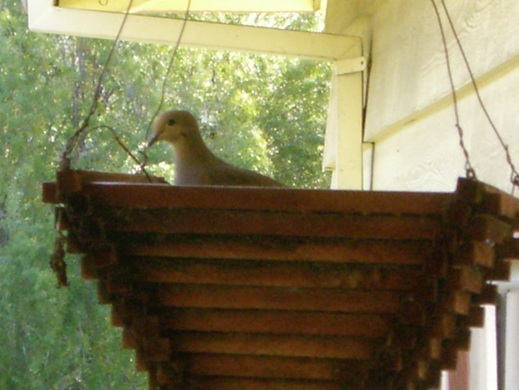
Friday night I had a sleep over with Mrs. Turner and all her bears and dolls and golliwogs. I was very excited about meeting new bears, and I have never met a golliwog, but Mrs. Turner told me all about them. I also visited the Emersons. Jean Emerson is a poet and her husband, Bill Emerson, has written a book about Johnny, the chicken who learned to fly.
This is me with Great Grandpa Roger’s tiger and frog
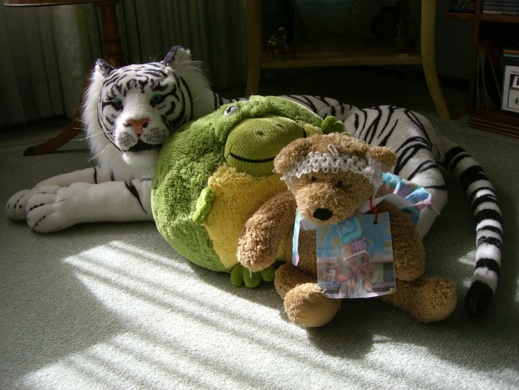
Today I went for a ride with G-G-Doris and G-G-Roger on their tandem bicycle. We went to dim sum in Milpitas, 15 miles roundtrip. I was securely roped into Great Grandpa's backpack which meant I had to ride backwards but faced Great Grandma so I could chat with her while she pedaled.
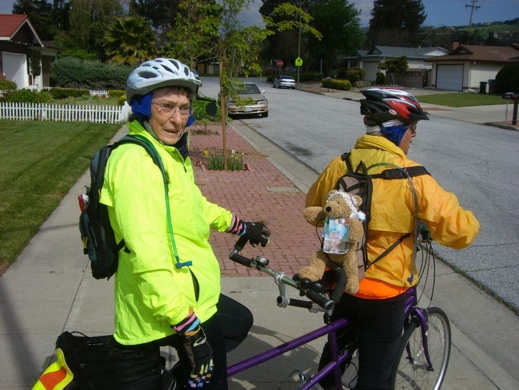
Me on the bicycle at dim sum
Great Grandma & Great Grandpa did not really leave me out here by myself, but took me in and let me sit at the back of the table while they ate dim sum.
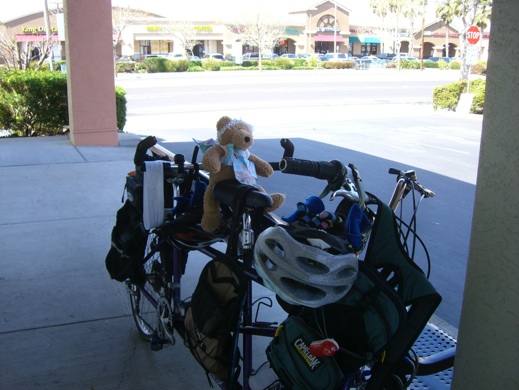
Tomorrow I am off to Tennessee.
Visit with Ms. Turner in San Jose
2605 La Hacienda Ct.
San Jose, CA 95127
March 19, 2010
Dear Friend,
I had a very interesting night, March 19, in San Jose, CA with a lady, Eva Turner. I stayed overnight at her apartment. She has a lot of dolls and bears, also two dolls that are called golliwogs. In the 1800s a lady from England was living in India and she made the dolls for her children to play with, calling them golliwogs. When she returned to England other people asked her to make them for their children. The golliwogs became famous. I had my picture taken with the two golliwogs and had a very good time learning about London, England where they came from.
This is me with the golliwogs at my sleepover with Mrs. Turner
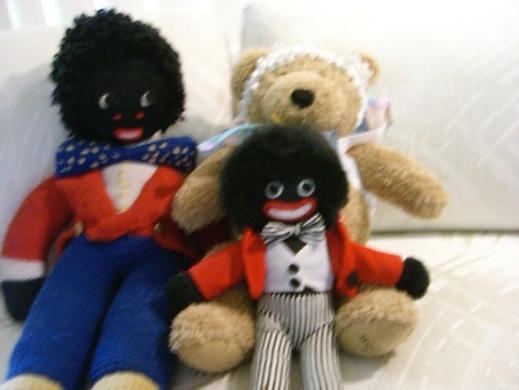
This is me with Mrs. Turner
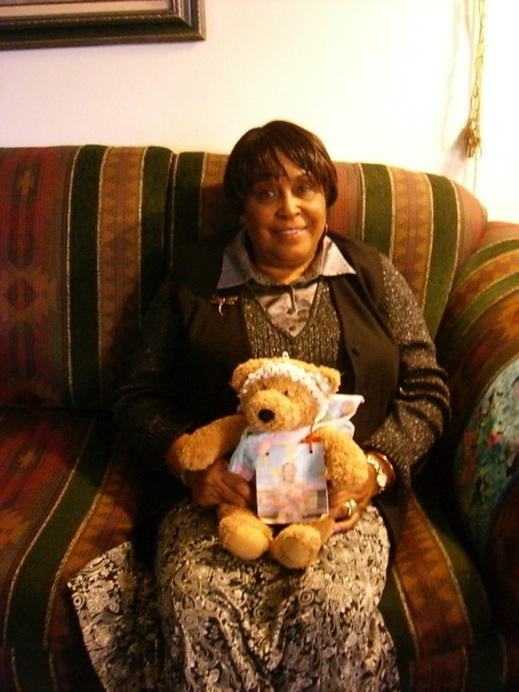
Visit with Jean & Bill Emerson in San Jose
March 20, 2010
Great Grandma Doris took me to visit her friends Jean and Bill, who live in an apartment. There are flowers and trees all around their apartment. And there is a swimming pool right outside their door. It would be fun to go there in the summer, but even in California it is too cold to swim in early March.
I hate to say this, but these people are old. I met Theodore Bear at Jean and Bill's house. He was Jean's bear when she was in the second grade. The poor old thing is over seventy years old and has lost a lot of his hair. Even though they are old, it is sort of fun to visit Jean and Bill, because they don't know that they are old.
Here is a photo of Bill & Jean Emerson, Joane Maser (head down behind Jean), Roxy across the table from Joane, and Lan Roberts, all members of Great Grandma’s memoir group, all having banh xeo.
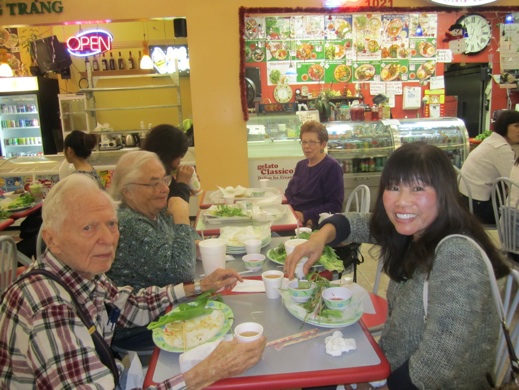
Bill writes stories about chickens. Jean writes poems about flowers and sunshine. She gave me a copy of a poem she had written about a bird that lived in the pond that was outside the apartment they lived in before.
When Bill was working as an engineer, he traveled all over the world. Sometimes Jean went with him. They have all sorts of things they bought at stores in different countries. Things like a Chinese puppet that Jean says was made of water buffalo hide. They don't mind if young bears play with the things they brought back from places like Japan and Scotland.
Jean showed me a poem she wrote for her grandson. He had a copy of it with a picture of his kite for several years when he was young. When that little boy grew up he went to Japan to study engineering. Now he designs communication equipment for a big company named Cisco.
Can You Imagine
For my grandson Aaron
One blue kite on a long, long string --
can you imagine such a thing?
Can you imagine being such a thing?
Can you feel the wind on your face?
Can you see the birds
playing hop scotch on the clouds?
Can you see the streets far below --
and houses no bigger than your toe?
One blue kite on a long, long string!
Can you imagine such a thing?
Jean Emerson
Flat Stanley, the boy who wanted to travel but got flattened by a bookcase
In January of 2010 I received an envelope from my great Granddaughter, Karyssa Newsom, who also lives in Sheffield, IL (she is a younger sister of Alyssa, above), containing a paper cutout of a boy. This was Flat Stanley, the boy who always wanted to travel but got flattened when a bookcase fell on him. Like Rosie Lou, last year, Flat Stanley wanted to have some adventures and take stories back to Karyssa’s class. So off we went again, to see what we could see.
Flat Stanley
January 26, 2011
I arrived at Great Grandma Doris and Great Grandpa Roger's house yesterday. Today Great Grandma Doris took me Tet shopping with her and her Vietnamese friend, Lan. In Vietnamese, Tet means the first morning of the first day of the New Year, which, in 2011, will be on February 3. That is the beginning of Lunar Year 4708.
Most of the Asian countries use a 12 year Zodiac and each of the 12 years has an animal symbol. In Vietnam this will be the Year of the Cat, in China it will be the Year of the Hare. The Chinese and Vietnamese both have the same animal totem in most of the years except for this year. Three other animals are slightly different, when the Chinese have the Year of the Pig, the Vietnamese have the Year of the Boar, and the Chinese Year of the Ox is the Year of the Buffalo in Vietnam, which are both pretty much the same thing. And Karyssa's year is the year of the Goat or Sheep or Ram (all very similar). I learned from Great Grandma's Japanese friend, Joane, that the Japanese celebrate January 1, as we do, rather than the Lunar New Year which most of Asia celebrates.
The Asian cultures celebrate the Lunar New Year for 7 days. It is the most important holiday of the year. On the first day of the new year, young people should visit older friends and relatives and wish them a good year. Usually the older people will have a gift of money for the young people, always given in a small red envelope. It is very important not to quarrel or fuss or be unpleasant during this week as your behavior this week sets the energy for your whole year.
In the Vietnamese and Chinese cultures, people do not ask how old you are, but in what year you were born. For example, Karyssa was born in the year 2003, which was the Year of the Goat/Sheep/Ram. (People born in the Year of Ram are elegant and highly accomplished in the arts, Ram year people are often shy, Ram people are wise, gentle, and compassionate.) So when she tells someone she is a Ram, they know that she is either 8, 20, 32, 44, 56, 68, 80, or 92 years old. In 2012 Ram people will be 9, 21, 33, 45, 57, 69, 81, or 93 years old.
We had a lot of fun looking at all the very different kinds of foods (and tasting some) that are important at this time of year for much of the Asian community. They have many pretty little cakes, brightly colored, and they looked very tasty. We had some Vietnamese food for lunch, banh xeo. It's a very thin pancake, made with rice flour and egg, then fried with some shrimp and bean sprouts inside. It looks kind of like a flat omelette or a very large taco. It is served with a little bowl of sauce and a plate piled high with lettuce and mustard leaves (much milder tasting than the mustard greens eaten in the south in this country where Great Grandma's family came from), and several sprigs of mint and cilantro leaves. You tear off pieces of the pancake (be sure and get a shrimp and some bean sprouts with each bite), add a couple leaves of mint and cilantro, and wrap it all in a piece of lettuce or mustard leaf, then dip into the sauce and eat it like a taco or burrito. It was very good. Lan said this is what poor people eat in Vietnam. Great Grandma thinks the poor in Vietnam eat much healthier than the poor in this country, many of whom seem to depend on french fries and hamburgers for cheap meals. Or any meals. She liked this Vietnamese “poor” meal very much.
We bought a large yellow chrysanthemum (with 9 blooms—Lan said 9 is a lucky number, as is 5) for Great Grandma's Chinese neighbors, who are 96 and 90 years old. Also, yellow is a good color for New Year. As we left this large Asian mall we stopped to buy a big yellow pomelo (like a grapefruit only larger and sweeter) and some sesame balls, of which Great Grandma is very fond.
When we got home from shopping Grandma Deana and Grandpa Steve were at Great Grandma's house so I got to see them, too.
Great Grandma eating banh xeo at Century Mall in San Jose
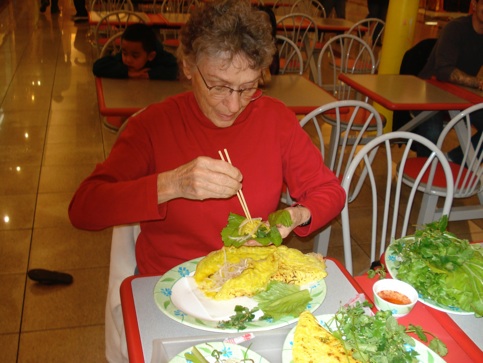
We went back to the Vietnamese place in the evening so Great Grandpa could try the banh xeo (and so Great Grandma could take some photos). He liked it very much, although it's pretty messy. There are photos of them eating their “poor person's meal.” We did not take photos when we went with Lan so we will include one of her and her husband, Jeff, riding their tandem bicycle on the Oregon coast last year. Great Grandpa went with them and rode his single bike. Jeff & Lan ride for 30-50 miles every weekend. Often Great Grandpa rides with them. If they go for a shorter ride (and only small hills) Great Grandma will go, too. But if they ride single bikes, it must be a much shorter ride for Great Grandma. She's only up to about 20 miles, round trip, on a single bike.
Jeff & Lan Roberts at the Northwest Tandem Rally in Eugene, OR, April, 2010
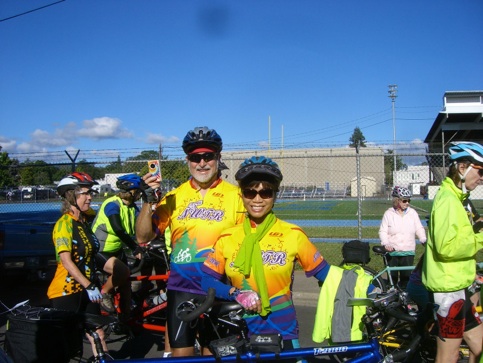
January 27, 2011
Today Great Grandma and I took Grandma Dean to the Good Will to look for a sweater, where we also bought some jeans for Great Grandpa. Then we went to visit Grandma Dean's childhood boyfriend who is in the hospital in Fremont. Later we stopped at a Thai restaurant for lunch, which both Grandma and Great Grandma love. We had Tom Kha Goong (a soup made with coconut milk, seasoned with galanga--kind of like ginger, basil, cilantro, lemon grass, and shrimp—goong), some brown rice, and some salmon steamed in a banana leaf in a yummy sauce with lemon grass and basil. It was very good. Great Grandma loves Tom Kha.
January 28, 2011
Today Grandma Dean and Grandpa Steve got up early and took Great Grandma to breakfast, Great Grandpa goes out with the ROMEOs (Retired Old Men Eating Out) on Fridays. When we came home Grandma and Grandpa packed and left for their 2 hour drive home to Yuba city. Great Grandma did laundry and cleaned the bedroom for the next guests, then started working on her income taxes, which she does not seem to be enjoying.
January 30, 2011
The next guest was soon here. Last evening Great Grandpa's nephew, Matt, came to visit. Actually, he came for a job interview at PG&E tomorrow in a nearby city. He drove 250 miles down here from where he lives in Northern California. Matt has a twin brother, Wes, who now works for PG&E.
This morning we took Matt and met Great Grandma and Great Grandpa's friend, Kate, at The Flames for breakfast. It was very good, but pretty much “white bread U.S. Food,” not really interesting. I think Matt prefers that. When we came home Kate helped Great Grandma install Microsoft Office onto her computer. Uncle David sent the MS Office CD to her for Christmas. Kate is very techy. Great Grandpa calls her their guru. He and Great Grandma visited Kate in Nepal 3 years ago when she was a flight instructor at the only flight school in that country. Sadly, out of business now. We forgot to take a picture of Kate at breakfast so Great Grandma will print a photo of the three of them on an elephant in Nepal. That's Kate on the right.
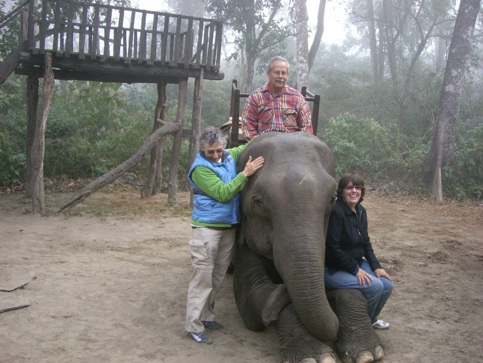
This evening we took Matt to Indian food. He does not like hot food very much but some of it he thought quite tasty. There are photos of all of us at dinner at Milan Indian restaurant. I think Matt preferred breakfast.
Uncle Matt having Indian food at Milan in Milpitas
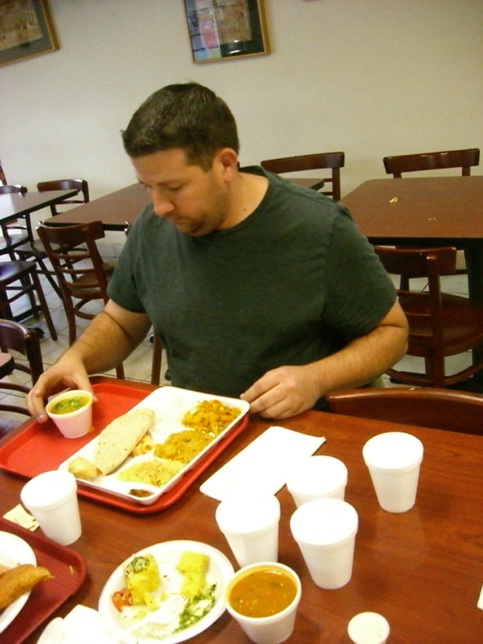
I think Great Grandma plans to send me back to you tomorrow. She would like to take me more places—I would like that, too—and write about more things here that might be different from what we have at home in Illinois, but she hopes that I will arrive home with this story in time for the Lunar New Year.
I am sorry to leave, but it would be nice to share all I have learned about the Lunar New Year with all of you.
Great Grandma returned to the Grand Century mall this morning and bought some little candies to go in little red envelopes to send for all the children in Karyssa's class, a Tet greeting and good luck for your new year.
Comment from Great Grandma Doris:
Re Flat Stanley: it was a lot of fun having him visit with us. We did notice some difference between his personality and that of Rosie Lou, the bear who visited last year from Alyssa's class. Actually, Flat Stanley's seems, well, kind of flat. However, that makes him much easier to fit into an envelope and carry in my purse, which is also much safer, as I am less likely to leave him lying around somewhere and forget about him. He is also much easier to ship. We enjoyed having him very much. And I enjoyed writing to you all about this week. Great Grandpa said to be sure and tell you that we do sometimes do something besides eat, though.
My Visit to San Jose
By Rebecca Newsom
I arrived at the home of Great Grandma Doris and Great Grandpa Roger in San Jose Monday, March 25, after spending a few days with Grandma Deana and Grandpa Steve in Corpus Christi (check.out the pretty shells I got there).
Tuesday, March 26, India Community Center and Gym
In the morning Great Grandma and Great Grandpa took me with them to India Community Center (ICC) in Milpitas, where they use the gym and go to activity classes. Great Grandpa Roger likes the spin classes (they spin the pedals of the stationary bicycles very fast) and Great Grandma Doris loves the senior yoga classes. They also use the muscle building machines to keep as much strength as possible as their bodies become older. Great Grandpa takes the weights and machines much more seriously than Great Grandma does and works out for another two hours., Great Grandma works out for about 45 minutes before yoga class, then it’s off to the shower after yoga.

Great Grandpa Roger preparing for his spin class
Senior Yoga Class
Many of the seniors can do the stretches and twists very well (as can Great Grandma), but some of them have damaged knees, hip replacements, or other types of worn out joints and muscles from many years of living and they do their exercises sitting in a chair. But they are always there, doing what they can. Always trying. Today’s class had only about 40 students, many days there are 50.

The senior yoga class, doing their shoulder rolls

The seniors exercising their knees
Most of the seniors who come to ICC in the mornings are from India, but all people are welcome and there are several Caucasians and other types of Asian (including Great Grandma’s friend, Don, who is from Myanmar) in the senior yoga classes.
India has many different “states” and many different languages are spoken. Hindi is the official language of India, and English is the universal backup language. Most of the seniors speak Hindi, although some speak Punjabi, Telagu, or another language, and most speak English well, but not all.
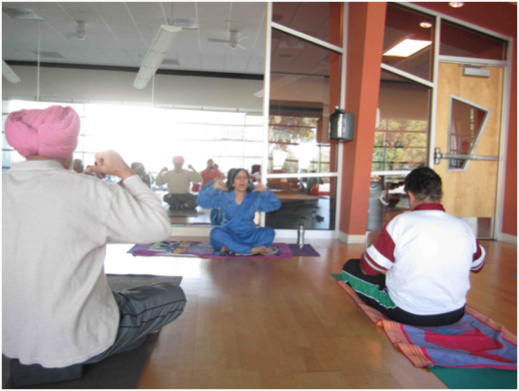
And we all follow our teacher Sushma with three “I Am Happy” mantras and then three big laughs (the best medicine) to close the class
After a nice hot shower, we go to the little café for lunch. Great Grandma gets a quinoa masala dosa. A dosa is a very large, very thin, sort of pancake usually made with lentil and rice flour, quinoa dosas are made with lentil and quinoa flour, quinoa has more protein than most other grains. A masala dosa has fried potatoes and onions with Indian masala spices inside. A dosa comes with a small bowl of sambar (a spicy soup with some veggies and maybe lentils in it) and a container of coconut chutney. Many Indians eat with their fingers. To eat the dosa, you tear off a piece of the dosa and use it to pick up a piece of potato, dip it into the sambar, and put it in your mouth, hopefully without dripping sambar in your lap. And occasionally you dip a piece of the dosa into the coconut chutney, which is usually mild, but sometimes it is hot. Great Grandma enjoyed it very much but I thought the sambar a bit hot.
Great Grandma loves dosa and she considers that her reward for working out—plus, of course, the strength she gains from the workout, hoping to improve the osteoporosis in her arms. Great Grandpa usually joins Great Grandma after she has finished her dosa. She always brings a book to read when she sits by herself.
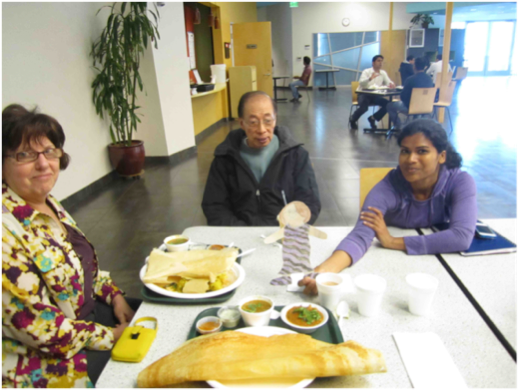
Jyoti holding me up to check out Kate’s & Great Grandma's dosas while Don looks on
Wednesday, March 27, Chua Duc Vien
Today Great Grandma picked up her friend, Eva, and we visited Chua Duc Vien, the Vietnamese Buddhist temple in San Jose which was envisioned, funded, built, and is now run by nuns. They cook and serve a vegetarian lunch daily for whoever comes.
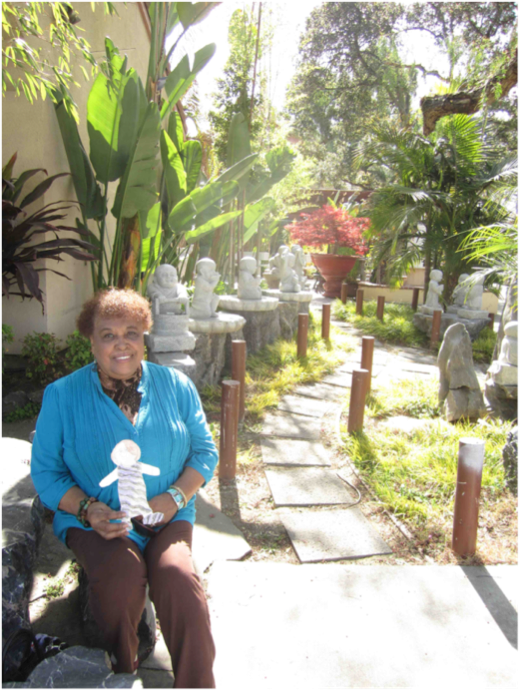
Eva & Rebecca at the entrance to Chua Duc Vien
The grounds of Chua Duc Vien have LOTS of trees and plants, many in flower. The flowering fruit trees were especially beautiful. There are also lots of little nooks with stone tables and benches or stools hidden in many little corners. We enjoyed exploring, it was so beautiful and peaceful. And LOTS of statuary, much of it carved by artists, but much of it was interesting architecture carved by nature, probably mostly water. And LOTS of really cute little carved Buddhas.
After our tour of the grounds, we went into the temple. There were nuns and a few other people singing and praying, so we stood quietly in the back until they finished and left. Great Grandma asked a woman who was leaving if we could take photos. The woman asked one of the nuns who said it was OK.
Here is a photo of the inside of the temple.
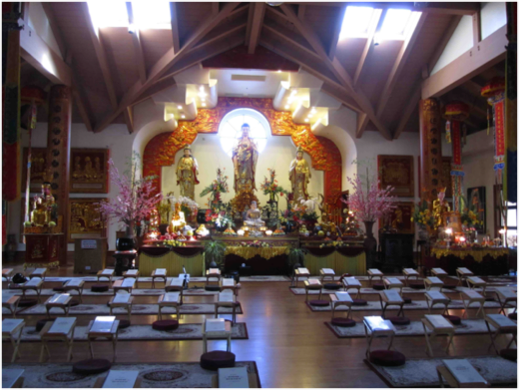
Inside the Chua Duc Vien temple
Quan Yin, or Guanyin, is the Buddhist bodhisattva of compassion. Guanshiyin means “observing the sounds (or cries) of the world.” In the western world she would likely be called the Goddess of Mercy. A bodhisattva is someone who seeks enlightenment for not only themselves but for all the world. Below is a photo of the Bodhisattva, or Goddess, Quan Yin.
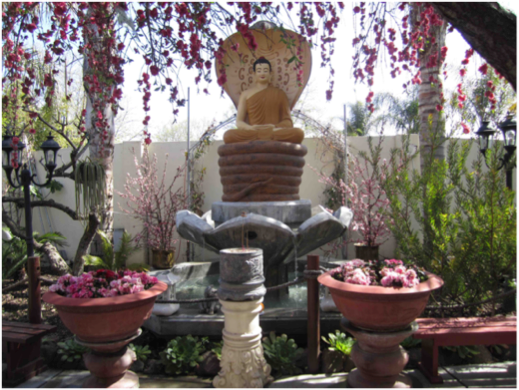
Feminine Buddha in cobra lotus
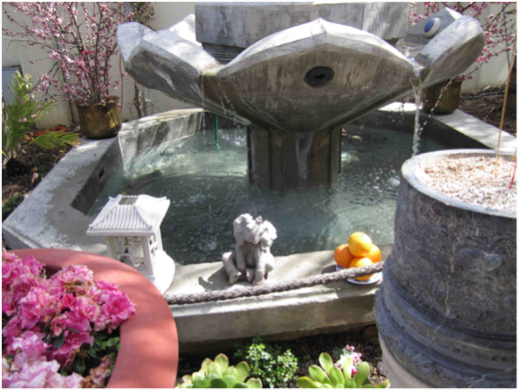
Little elephant at the foot of the cobra Buddha
We walked around the grounds a bit more, it was so beautiful, then into another building and had lunch that the nuns prepare daily for anyone who wants to eat. Great Grandma made a donation for our lunch (although if you do not have money, you do not have to pay). In our lunch we recognized okra and rice, everything else was strange to us, but it was good. And it is fun to try new things.
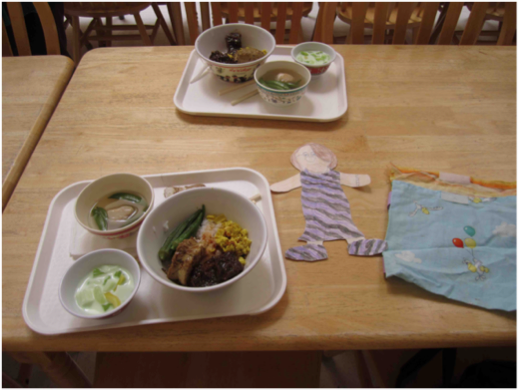
Rebecca sharing vegetarian lunch prepared by the nuns at Chua Duc Vien
Thursday, March 28, More Visitors
Today we picked up Uncle Tom and Malin, his friend from Sweden, at San Jose airport. They are visiting from Boulder, where Uncle Tom lives, for a few days. Uncle Tom met Malin in India where he recently stayed for 3 months. She came to Boulder to visit him, and now they are visiting us.
Uncle Tom also met a young German woman there (whom he named Blue) and they all became very good friends. Blue’s name is Annina, but she likes being called Blue, so that is what we call her. She is couch surfing in San Francisco for a few days but returned to Great Grandma’s today. She came down to San Jose on the train and we picked her up at the train station downtown this afternoon. Blue and Malin were so happy to see each other. They shared a big hug for a long time.
It will be a very full house. I don’t know where they will all sleep, but Great Grandma said it will probably be better than their accommodations in India and she’s going to let them figure it all out for themselves.
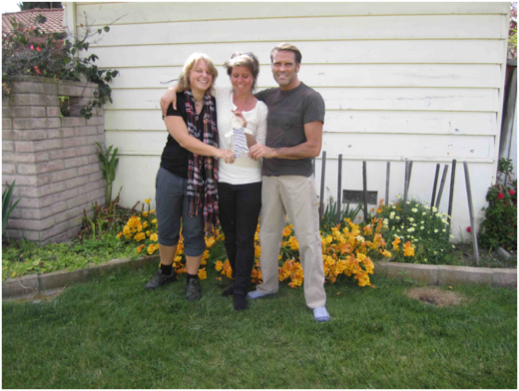
Blue, Malin, Rebecca, & Uncle Tom
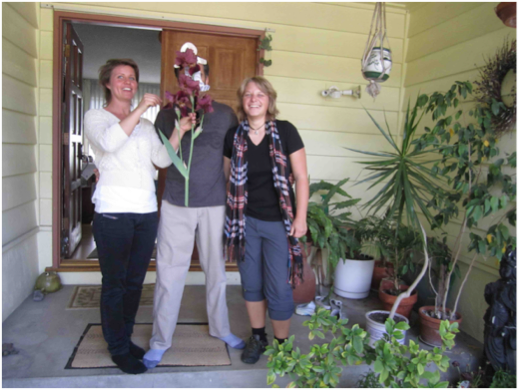
Malin, Rebecca (hiding in the Great Grandma’s beautiful iris), and Blue
Uncle Tom may have met his match with these two.
Friday, March 29, Big Basin and the Redwood Trees
Today Uncle Tom and Malin and Blue took me with them to Big Basin. Big Basin is a sort of forest basin down in the Santa Cruz mountains, between San Jose and Santa Cruz. The mountains are not really “down” from here, but the basin feels like it is down, as you come down into it from on top of the mountains. The Santa Cruz mountains are not high mountains, like in the Sierras where some peaks are 10,000’ or more. The highest peak in the Santa Cruz mountains is not quite 3,800’, and the ones we drove through do not get over 2000’. But they are rugged and rough, with trees and cliffs like mountains, rather than smooth and round and grassy like hills.
There are a lot of really big trees in Big Basin. The biggest ones are called redwoods, as they have red bark on their trunks. The correct name for these redwoods is Sequoia Sempervirens. They are also called coast redwoods. These trees grow very tall, 200’ is common. One in far northern California is 379’ 3” tall.
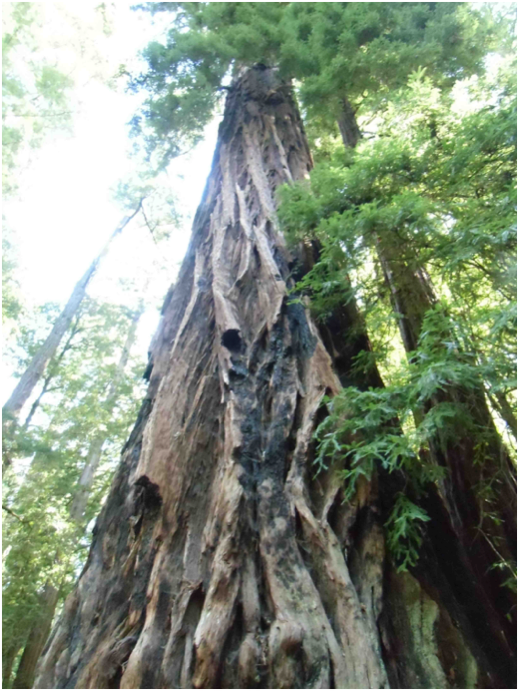
Sequoia Sempervirens (redwood) tree in Big Basin
The oldest known coast redwood is about 2,200 years old. They have a lot of tannin in their bark, which makes them resistant to insect damage, as tannin tastes very bitter. They are also resistant to fire, due to their lack of resin. The same is true of the Sequoia Gigantea (or Sequoiadendron giganteum,) which are the largest trees in the world by volume. These redwoods grow only on the western slopes of the Sierra Nevada mountains in California. The General Sherman tree in Sequoia National Park weighs 625 tons. It is the largest living thing in the world. The oldest of these redwoods are thought to be between 3000 and 4000 years old.
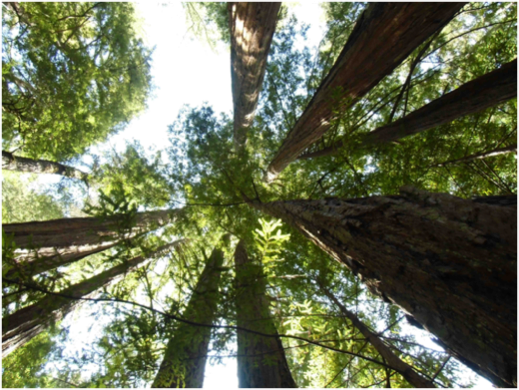
Sequoia Sempervirens trees in Big Basin State Park
We did lots of hiking through the forest in Big Basin and then we continued driving west down the mountains to the Pacific coast near Santa Cruz, and on down the coast to Capitola where we had lunch by the beach. And coffee. Malin, being from Sweden, is a big coffee drinker.
Monday, March 31, San Francisco
Today we drove to San Francisco. It was crowded in the car with Great Grandpa driving (yes, they still let him drive) and Uncle Tom in the front, Blue, Great Grandma, and Malin in the back. They traded me off between the front seat and the back so I could see everything.
Golden Gate Park
Our first stop was Golden Gate Park. It is a large park in the heart of San Francisco. It is 3 miles long and half a mile wide. It goes from the beach in the west to near downtown San Francisco.
We took photos of a beautiful tree in bloom. There were many trees like this in the park.
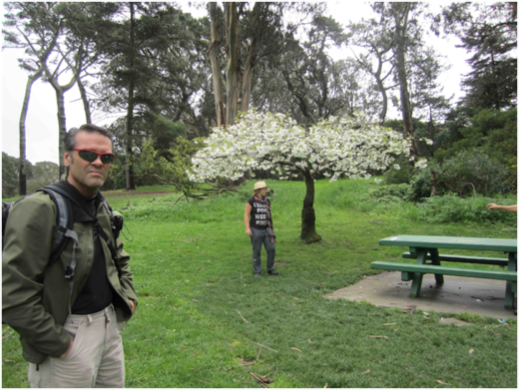
Blue under one of the beautiful trees in Golden Gate Park, Uncle Tom in the foreground
Lombard Street
Whenever you have a new visitor Great Grandma says you MUST drive down Lombard Street. . Uncle Tom walked down, Blue had seen it and she’s tough, but Malin and I were really nervous, especially when Great Grandma said something about “should have fixed brakes,” although I think she was just trying to scare us.
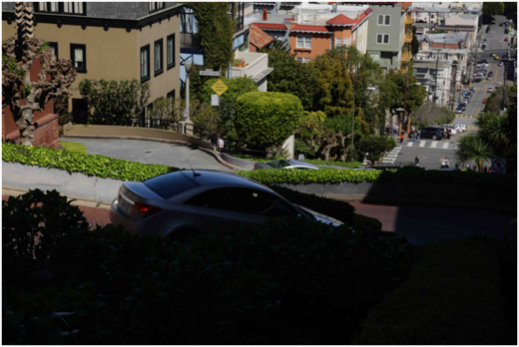
Lombard Street is called “the crookedest Street in the world,” but there is one more crooked on Potrero Hill, altho’ it is shorter.
Fort Point
We drove from Golden Gate Park to Fort Point, located on the southern side of the golden gate, at the entrance to San Francisco Bay. It was built in 1853 to defend San Francisco Bay against hostile warships. Fort Point is now a national historic site. They are doing seismic work (something about earthquakes, which occasionally happen in California) now so the fort was closed but we walked along the bay. Fort Point was built before the Golden Gate bridge was (which was completed in 1937,just 75 years ago) so the bridge is built over top of Fort Point.
Here is a photo of everyone sitting on the breakwater at the edge of the bay with the Golden Gate Bridge in the background.
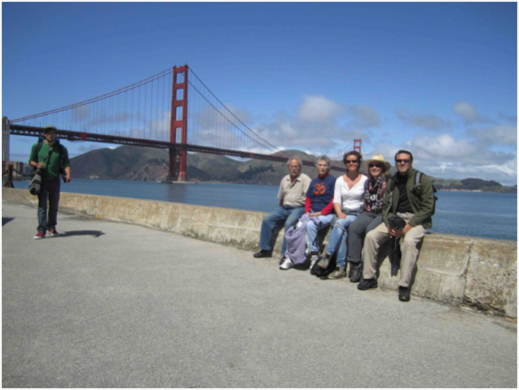
Great Grandpa, Great Grandma, Malin, Blue, Uncle Tom
Palace of Fine Arts
From Fort Point we drove to the Palace of Fine Arts, which was built in 1915 for the Panama Pacific Exposition. It is very beautiful.
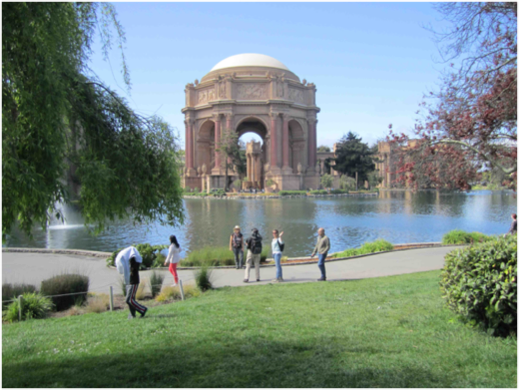
Blue, Malin, Uncle Tom, and Great Grandpa Roger on the path in front of the Palace of Fine Arts
We walked all around the grounds and found a swan nesting among the lilies just outside the pergola.
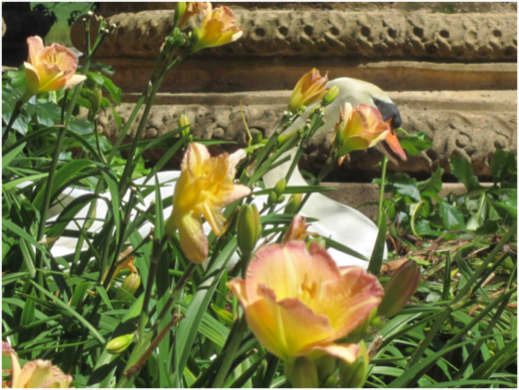
Swan nesting among the lilies at the Palace of Fine Arts
Chinatown
We drove back toward the center of the city and parked about a mile from Chinatown where we had lunch. Great Grandma was complaining loudly by this time, up the hills, down the hills, then up another hill and down again. Fortunately, the walk to Chinatown was mostly flat.
San Francisco’s Chinatown is the largest Chinatown outside of Asia, and the largest in North America. It was established in 1848, just before gold was discovered in California. It is a Chinese area that continues its own customs, languages, places of worship, social clubs and identity. It covers 24 square blocks of San Francisco.
Here is a photo of Grant Avenue, the main and most popular street in Chinatown.
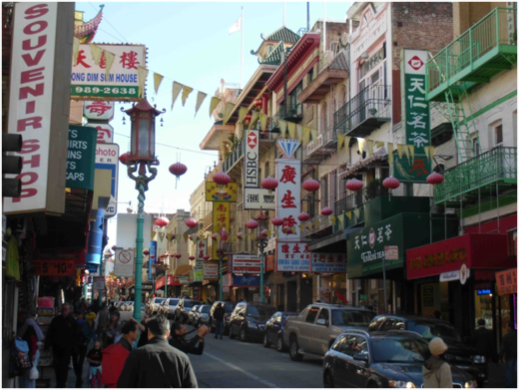
Grant Avenue in San Francisco’s Chinatown
We had lunch at Woey Loy Goey, which seems to be in a basement on Washington Street, just off of Grant Avenue. Here is a photo of the menus on the wall there.
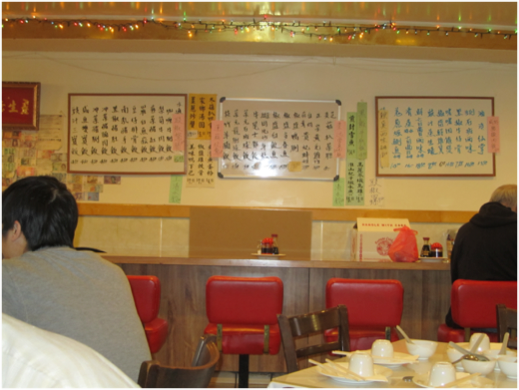
Menu on the wall of Woey Loy Goey restaurant in Chinatown
Great Grandma says that every Chinese restaurant brings fortune cookies with the bill, enough for each person at the table. When we finished our lunch, Blue thought to ask the waiter where the fortune cookies were made, was there a factory in San Francisco that made fortune cookies.
Actually, we had to have another waiter--who knew more English--explain to us that there was a fortune cookie factory just up the road from Grant Avenue, in Ross Alley. Again, walking, and uphill, but it was worth it.
The first thing that Great Grandma noticed when we entered the narrow room was the smell of chocolate. She said she had never seen a chocolate fortune cookie. But we found some there. She bought a bag of fortune cookies for me to bring home for all of us to try. Half chocolate, and half not chocolate.
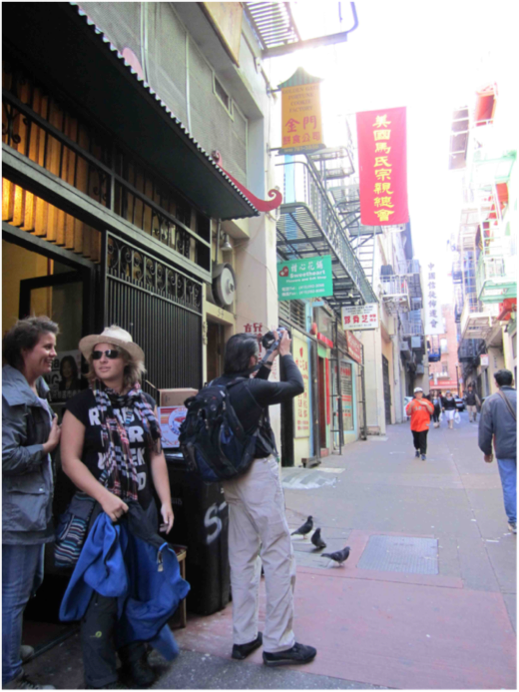
Malin, Blue, and Tom (always taking photos) in Ross Alley in front of the fortune cookie factory, which is right behind Malin
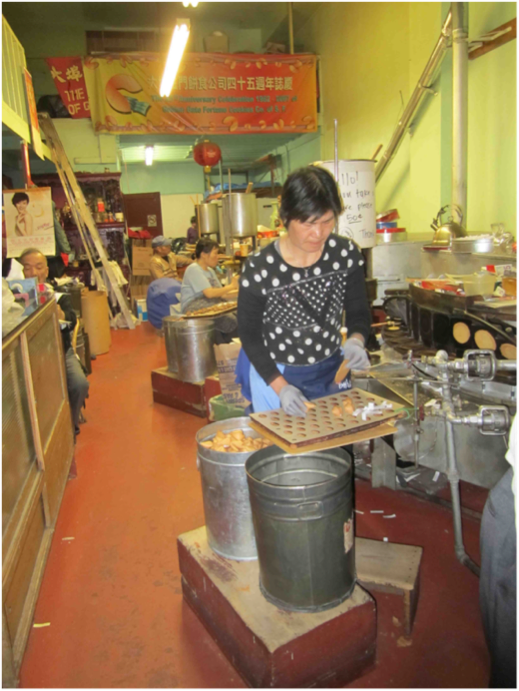
A woman placing fortunes into the cookies, which she then twists into fortune cookie shape.
From here Uncle Tom, Malin, and Blue decided to walk to the cable car line and ride the cable car down to near Fisherman’s Wharf and walk around there for awhile. They would meet us at Ghirardelli Square for some yummy chocolate something.
Great Grandma and Great Grandpa walked back to the car and on the way we found a nice little coffee shop on Columbus Avenue so we stopped for coffee, giving our poor feet a break.
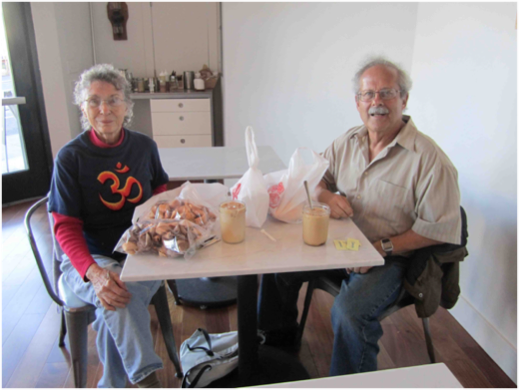
Graffeo Coffeehouse on Columbus Avenue in San Francisco
There was a very interesting wall hanging in Graffeo Coffeehouse. It was a wood framed planter box with many tiny containers of different succulents arranged in the form of our stars and stripes.
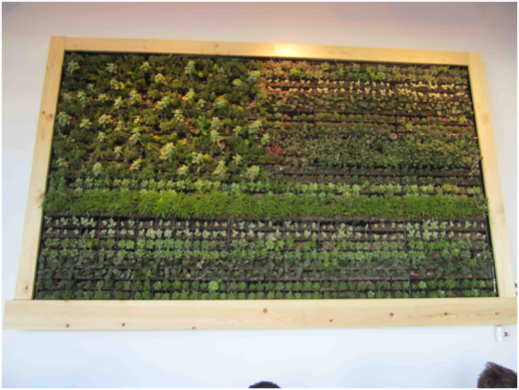
Stars and Stripes in herbs, hanging on the wall of the Graffeo Coffeehouse
Ghirardelli Square
We finished our walk to the car and drove down to the Fisherman’s Wharf area to walk half a mile or more from where we found parking to meet Uncle Tom, Malin, and Blue at Ghirardelli Square. (Finding parking in San Francisco is a chore. And often very expensive.)
Ghirardelli is a very old chocolate company, so of course, we had to taste a bit, including hot fudge Sundae. It was really yummy. The chocolate factory is now a sort of indoor/outdoor mall with lots of shops, many of them selling different kinds of sweet stuff as well as other touristy stuff.
Twin Peaks
Last and best on our tour of San Francisco was Twin Peaks, twin 922’ high peaks on the southwest side of the city. It was nearly dark when we got to the top. But the view was wonderful. You could see all of the city, and Market Street coming straight out from the bay toward the foot of the peaks.
It was very cold up there, as the wind almost always blows in San Francisco, coming off the bay from one direction, and from the Pacific ocean in the other. It is cold in San Francisco most of the time. Great Grandma said this was the nicest day she had ever spent in San Francisco. It was sunny (rare) and warm (very rare) and just a lovely day for lots of walking. But by evening, in that wind, it was really cold.
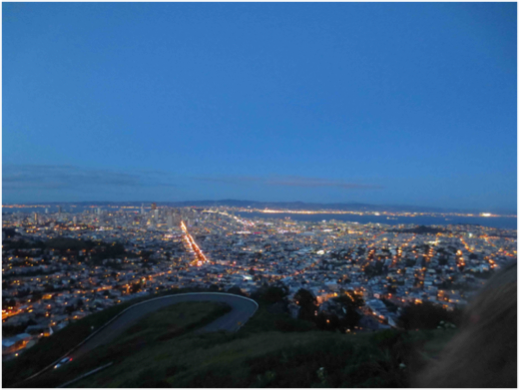
View of San Francisco from Twin Peaks at dusk
Finally, we drive home. I saw a couple of heads nodding as Great Grandpa drove, before my own eyes closed. It was good to get home to Great Grandma’s and bed.
Tuesday, April 2, Visitors Begin to Leave
We had to get up very early the next morning to take Tom and Malin to the airport to return to Boulder. So we came home to an almost empty house. Kate has gone to work and Blue has repossessed her bed and is finishing her night’s sleep. Great Grandma and Great Grandpa go back to bed for awhile, too. I didn’t mind a few more winks myself.
Wednesday morning, at the much more civilized hour of 11:30am, Blue flies home to Germany. So now it is really quiet in the house. Great Grandma begins the tasks of laundry and restoring some sort of order to the house.
But she is very lonely, although she welcomes the quiet and peacefulness.
Time for Me to Go, Too
And now Great Grandma is helping me finish my story as it is time for me to return to Karyssa. I have done lots of interesting and exciting things visiting Great Grandma Doris and Great Grandpa Roger and I will miss them. And I think they will miss me, too.
The Leader of the Pack
January, 2009
Here we are, with a brand new president, what looks for all the world like a real leader, who sounds like a real leader, and who is actually accomplishing progress—in spite of the media’s dire predictions and too early claims and assertions setting an energy of failure bringing real fear into the hearts of the people of this once great nation.
And I think he even knows how to play them, the media. Time will tell how cleverly he really does this, but early indications look like a well trained and observant student of working the media. Which, in my opinion, could use some serious working over.
I often stop myself to think about how, maybe one day soon, we can stop feeling ashamed of our country, maybe soon we can again hold our heads high—not from pride in what too many seem to see as our natural superiority, but from pride in a real and solid dignity that comes from standing in one’s own and real truth that has replaced that myth of superiority. In some areas.
My heart is full and sometimes overflows from my eyes when I think that only a year ago I did not believe this day would come. Less than two years ago there was not even a hint of a thought in anyone’s mind— save, maybe one—that we would see such a solid and strong man living in our White House.
That we would see a Black Man living in our White House? Unthinkable! Not necessarily undesirable, but, really. No way is this nation ready for that.
Yet, here we stand, miles ahead of where we were just one month ago. With real change barreling along, stumbling and hiccupping occasionally, over stubbornness and habits of long standing—as well as the media—but finding ways to either do an end run around the blockages or to plow through them with brute force using the pin head of the media to cut through the debris being thrown in the way.
Doris Tuck
February 2009
Convenient Untruths
Many years ago I attended a little metaphysical church in Willow Glen called The Family of Man. I learned so many things there, small and large, healed so many sores, old and new, and stored so many thoughts, some strong ones and some questionable. Many of these thoughts settled in to a good understanding, some seemed to get lost, others continued to question and some still do.
Occasionally one of these memories pops up into today's world, often at inconvenient times. Perhaps conveniently.
One of those memories concerned truth and not truth.
Have you ever noticed how sometimes the words of someone speaking to you very sincerely and straightforwardly, come out of their mouth and sort of dribble down their chin? No matter what force and justification they use for their words, how rational the explanation, or however much you try to accept the words as truth, how much the subject is really not your business to judge, anyway, or how much force you use to justify your acceptance of the words. The words still dribble down the chin and fall to the floor in an ugly puddle that quickly dissipates.
The problem seems to be, why does it bother me? Why do I think on it? The subject certainly is theirs to choose and theirs to place wherever feels comfortable to them. And any other explanation would be just as valid. Even simply, “I don't want to.” Which is probably what is truth. And in the long run, would probably feel better to them and certainly would feel better to me.
Coming from a stranger, or a new acquaintance, it would not be a problem. It would probably not even be noticed. Certainly it would not need storing or protecting. Or defending. Who cares?
But lies add up, including those that are not mine. And they do cause damage, even when it's not my business. Even when the subject is not important. Or when it is very important. Where do you store shit in your being, away from harm, to itself, to yourself, or to anyone else? Somewhere where no damage can be done by it to either party.
And when you back off and let the thoughts flutter where they will, you notice the timing. Why did this memory come up at this time? You have already accepted that it doesn't matter. It is not yours to accept or not. Yet there it is, the elephant in the room. How do you get rid of it? Refusing to think about it does not work. It's still there. Guilt for your judgementalism neither works nor distracts. Realizing the guilt is not particularly valid makes the guilt go poof, but that bloody elephant is still there.
And all you can seem to do is whimper, it doesn't matter, it doesn't matter. And step around the elephant until it realizes its unimportance and fades. But it feels like no matter how thoroughly it fades, there are always traces left. Of distrust, of soreness slow to heal, and ego bruise. Why am I not worth the truth? How terrible can the truth be that I cannot be trusted with it? Even such a truth as “No,” with no explanation or justification.
Is there a point in there on which I can focus and begin healing? A thought comes that perhaps the ego is a point through which I can dump the shit and cleanse it from within me. Perhaps the ego is good for something more than just sensitivity and pride. Perhaps it is one of those places, portals of transport, through which the world can change, Harry Potter style, if we only knew how to use it as such.
The elephant has faded, but the pain of the lie, added to the pile of previous lies, still whispers.

Quan Yin at Chua Duc Vien
Vietnamese Temple in San Jose
This is my web site, with some of my memories, poems, and travel stories (all true).
I began this journey via friendship with Jean Emerson, a local poet and mentor for many people that she wanted to see explore into their life more deeply and learn about it via writing about it.
